Doug MacLeod's Blog, page 5
November 6, 2012
The Margaret Fulton musical is nearly here.
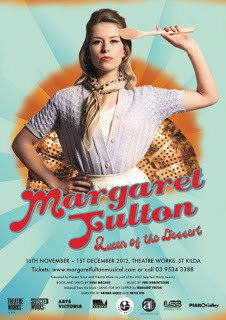
With a bit of luck, my stroky Dad may be well enough to attend the forthcoming production of Margaret Fulton, Queen of the Dessert, the musical that I wrote with composer and mate Yuri Worontschak. The cast members are young and ludicrously talented. Our beautiful leading lady, Amy Lehpamer, can play the violin as well as sing and dance, so we've written a violin solo into a scene set in The Rocks in Sydney, where the tenants (Margaret's friends and neighbours) sing a song about their love of La Vie Boheme. I started writing this so long ago, it's hard to believe it's about to happen. Although we've just has one major setback: poor Amy, our beautiful leading lady, has caught chicken pox, so she can't rehearse for a week.
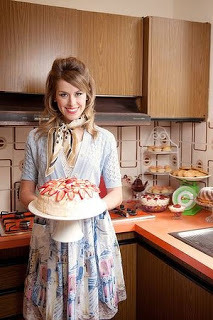 Amy Lehpamer not with chicken pox I haven't made a big deal about my stroke recovery in any of the media interviews I've done, but the fact that you're reading this blog suggests that you might already know about it. For the moment, I think that one of the best things you can do to aid stroke recovery is keep busy, find a group of energetic people to be busy with, and put on as musical. I realise this remedy may not be readily available for all stroke survivors. I'm particularly fortunate in that regard. It all started when I volunteered to work on the musical Call Girl last year. Call Girl is a musical written by my friend Tracy Harvey. It's about love and laughter in a call centre. Tracy actually worked in one of these places for a short while. YOu have to harden up. Most people you 'cold-call' really don't want to talk with you, and you might have dragged them away from something important, such as Letters and Numbers or dinner. It was interesting for me to go from an experience of dreading the call centre calls, to a position where I couldn't wait for them to ring me, so that I could plug our show. I think I must be the only person who ever managed to 'sell' anything to a call centre caller. Tracy kept a notebook full of the adventures of working in the call centre, and came up with a clever script where it was possible to sympathise and even cheer for the 'phonies', after all, they were human beings like you or me, who had, in many cases fallen on hard times. One of the best experiences of working on Call Girlwas getting the chance to work with director Bryce Ives.
Amy Lehpamer not with chicken pox I haven't made a big deal about my stroke recovery in any of the media interviews I've done, but the fact that you're reading this blog suggests that you might already know about it. For the moment, I think that one of the best things you can do to aid stroke recovery is keep busy, find a group of energetic people to be busy with, and put on as musical. I realise this remedy may not be readily available for all stroke survivors. I'm particularly fortunate in that regard. It all started when I volunteered to work on the musical Call Girl last year. Call Girl is a musical written by my friend Tracy Harvey. It's about love and laughter in a call centre. Tracy actually worked in one of these places for a short while. YOu have to harden up. Most people you 'cold-call' really don't want to talk with you, and you might have dragged them away from something important, such as Letters and Numbers or dinner. It was interesting for me to go from an experience of dreading the call centre calls, to a position where I couldn't wait for them to ring me, so that I could plug our show. I think I must be the only person who ever managed to 'sell' anything to a call centre caller. Tracy kept a notebook full of the adventures of working in the call centre, and came up with a clever script where it was possible to sympathise and even cheer for the 'phonies', after all, they were human beings like you or me, who had, in many cases fallen on hard times. One of the best experiences of working on Call Girlwas getting the chance to work with director Bryce Ives.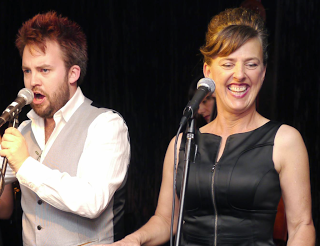 Director Bryce Ives with the fabulous Tracy Harvey
Director Bryce Ives with the fabulous Tracy Harvey Bryce is 28 and one of the most dedicated people I have ever met, somehow making himself available to deal with the concerns of cast and crew (and there were plenty) while somehow keeping the whole vision of the show together. Our cast (with the exception of Tracy) were all fairly new to the business, but Bryce brought out the best in them all and the end production was slick and funny. I hope we get a chance to do it again.
After seeing how well Bryce brought together the various components of Call Girl I decided to show him the remnants of a script and some songs I had written for the Margaret Fulton musical. There have been a lot of bio-musicals lately, as well as some that take inappropriate subject matter and turn it into a musical, so the biggest joke is that someone has gone to the effort of producing a whole musical about the life of Shane Warne, or a dystopian world called Urinetown, where water is scarce and lavatories may only be used if a substantial fee is paid to the corrupt company (Urine Good Company) that runs the town. The trouble is, unlikely subject matter that is often the only joke, and what might have worked well as a two minute joke on The Simpsons (they've already done parody-musicals based on The Planet of The Apes and also A Streetcar Named Desire, to name but two) flounders when it reaches the midway point. I haven't seen Warne, so I don't know if this criticism applies, but I did see Urinetown, and also the musical about the Jerry Springer Show, and it was hard for me to last the distance.
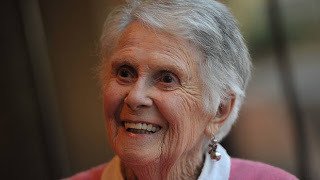 Margaret being a 'celebrity chef'- a term she hates. She will not be taking part in future seasons of Masterchef
Margaret being a 'celebrity chef'- a term she hates. She will not be taking part in future seasons of MasterchefI'd met Margaret Fulton - the 'celebrity chef' - while doing some research on a TV program proposal for sTeve Vizard's production company.MArgaret and I spent a morning together. Margaret was, and is, phenomenally entertaining. Conversations with Margaret often collapsed into giggles as Margaret would suddenly go off on a tangent, recalling an anecdote that might involve Germaine Greer or Jorn Utzon or any other artistic, ploticakl and literary celebrities of the fifties and sixties. Margaret, you see, had a knack of being in the right place to commune with the great and near-great. It helped, of course, that she was strong-willed, intelligent and courageous. Margaret was the first female business executive in Australia, with her own line of credit. The musical recreates some funny but true moments where male executives have underestimated Margaret, or even mistaken her for a 'lady of low morals', which once happened during a business trip to Canberra. After I met Margaret I was determined to create a musical about her life, since the performing arts had been such a major part of it. This was, I think, before Casey Benetto did such a good job with his musical about the life of former Australian prime minister, Paul Keating. I think one of the reasons Keating worked so well is that Casey put a lot of heart and soul into the script. It wasn't just funny (fantasically so) it was also moving and a fair representation of a full life. I intended to make the Margaret FULton musical a genuine biographical piece with music of the various periods of history that Margaret's life spanned.

A typical Margaret Fulton pic from the early sixties. You can tell she's a communist, can't you?
When Adam Cook, the artistic director of The State THeatre in Adelaide asked me if I had any show ideas (we had just finished working together on the Midnite musical), I mentioned the Fulton project and he burst out laughing. He thought I was proposing yet another of those inappropriate subject matter joke-musicals. To give people an idea of what I really wanted to do (and Margaret was yet to give us her blessing) I thought the best thing would be to put together a collection of songs to demostrate the sweep of the project. I bought the rights to margaret's autobiography, and the firtst song I wrote was a huge thing called The Book. It's a song about Margaret's first cookery book, which broke all records by having an initial print run of one million. That's the story as history has it, anyway. I don't quite know how it is possible to do such a massive first print run unless you are, say, doing the latest volume in the Harry Potterseries. But Margaret insists that Paul Hamlyn, the famous semi-teutonic publisher and patron of the arts commissioned an initial print run of a million - when there were only about eighteen million people in Australia. (This gives you an idea of how popular Margaret Fulton was in the fifties and sixties, when she was contributing to Woman's Day and New Idea, as well as appearing on the exciting new medium of television. I suppose if anyone could do it, then Paul Hamlyn, with all his Asian printing connections, could. There's a song about him in he show, and we've delighted in presenting him as the King of Colour, a sort of pop-art swinging guruthat would be quite at home in The Beatles' movie, Yellow Submarine. And we've placed him right at the heart of swinging London, where Margaretdid dozens of highly successful book signings (although people weren't queueing around the block as they did at the Australian signings). So the first song I put down with Yuri was a massive rock opera piece about this massive book that introduced bland Australian cooks to such novelties as garlic and Indian spices.
 Australia really was somewhat insular in her cookery tastes. Never mind that we were in the middle of the pacific, but we based our menu on English rather thasn Asian tastesExotic herbs like cumin or cardamom were bearly heard of. But Margaret Fulton's cookery book introduced Austrtalian men and women (okay, mainly the women) to a myriad of new flavours and exotic methods of food preparation. Rraders of The Women's Weekly lapped it up, and MArgaret's book became the cornerstone of modern Australian cuisine. All the while, Margaret was presenting a fairly conservative image to the readers of the women's magazines. Most photographs of her featured her presiding in a matronly way over wonderful spreads of food; exotic, spicy food that the readers could make for themselves. But Margaret's seemingly conservative image was at odds with her true self. Fiercely independent, she set out to create a career for herself in Big Bad Sydney (she was born in Scotland but brought up in Glen Innes, in rural New South Wales). Margaret had a young daugter from her first marriage, which broke up fairly swiftly when both parties realised they didn't share a lot in common. Thus, Margaret was a 'rebellious' single mum (there weren't so many of them back then) who decided that the best, most convenient place to live would be in the famous, sometimes derided 'Rocks' district of Sydney, right near the south end of the bridge.
Australia really was somewhat insular in her cookery tastes. Never mind that we were in the middle of the pacific, but we based our menu on English rather thasn Asian tastesExotic herbs like cumin or cardamom were bearly heard of. But Margaret Fulton's cookery book introduced Austrtalian men and women (okay, mainly the women) to a myriad of new flavours and exotic methods of food preparation. Rraders of The Women's Weekly lapped it up, and MArgaret's book became the cornerstone of modern Australian cuisine. All the while, Margaret was presenting a fairly conservative image to the readers of the women's magazines. Most photographs of her featured her presiding in a matronly way over wonderful spreads of food; exotic, spicy food that the readers could make for themselves. But Margaret's seemingly conservative image was at odds with her true self. Fiercely independent, she set out to create a career for herself in Big Bad Sydney (she was born in Scotland but brought up in Glen Innes, in rural New South Wales). Margaret had a young daugter from her first marriage, which broke up fairly swiftly when both parties realised they didn't share a lot in common. Thus, Margaret was a 'rebellious' single mum (there weren't so many of them back then) who decided that the best, most convenient place to live would be in the famous, sometimes derided 'Rocks' district of Sydney, right near the south end of the bridge.
The Rocks. It used to be rough, now it's a repolished gem, a bit like my beloved St Kilda.
Margaret's friends were her fellow tenants; a lively mixture of actors, artists, writers and musicians. The show features a big song called La Vie Boheme, or The Bohemian Life, which was very much the life that Margaret lived when she wasn't working in the ACP building on one of the magazines. Margaret's daughter Suzanne is on record as saying that she thinks her mother had poor taste in men. THey were always good-looking and 'interesting', but they were sometimes dishonest, even predatory. I wrote a song called Decorative, Elegant and Useless, which strives to encapsulate Suzanne's opinion of her mother's ability to hook up with disastrous men. I wrote two more songs, one piece to encapsulate Margaret's energetic philosophy of life. It's called I Sang for My Supper. My favourite song in the show is about a 'BOhemian' character called Mandrake the Magician, a female legal eagle who attended one of Margaret's many custume parties, dressed as the male cartoon superhero Mandrake, and promptly had an affair with Margaret's husband at the time, Denis Doonan.
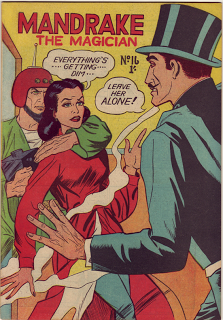 Leave her alone! Mandrake the magician faces an evil spaceman
Leave her alone! Mandrake the magician faces an evil spacemanWith the bare bones of a script and a CD of six songs I pitched the idea to Margaret. I wasn't quite sure how she would take it, but it was a good pitch. Yuri Worontscak produced the songs so that they were technically of a high standard, and we had good singers such as Mark Trevorrow and Shaun Micallef performing the lyrics. I sat and listened to these songs with Margaret, having to translate a few lines because Yuri, like many musical producers, thought the music was more important than the lyrics and the balance was wrong. Lyrics disappeared in lilting seas of music. I was most concerned about the Mandrake song, since it dealt with such a personal part of Margaret's life. But I was rapt when Margaret smiled at the end of it. 'She was exactly like that,' Margaret said, especially in relation to 'Mandrake's' line that the reason she always worked so hard on being a superhero was that she 'couldn't find love'.
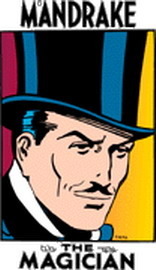 Imagine being cheated on by Mandrake. Spiderman you'd understand, but Mandrake?
Imagine being cheated on by Mandrake. Spiderman you'd understand, but Mandrake?So, Margaret apparently liked the songs and when she decided she could trust me, she let me go ahead with writing the musical.
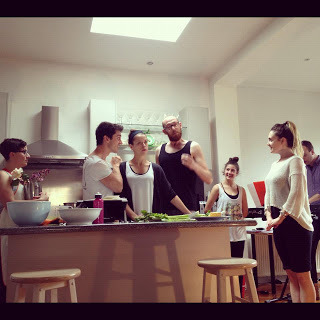 Our cast, gathered in Bryce Ives' kitchen, where many of the rehearsals took place.
Our cast, gathered in Bryce Ives' kitchen, where many of the rehearsals took place. It's punishingly hard to produce musicals anywhere in the world, let alone in Australia, so I suspected we would have to give it to one of the local theatre companies to present as part of their season. It wasn't a vast production, just a sort of chamber piece with five performers and a small band. Yuri and I shook hands on the production and we took it to Simon Phillips, who was then the artistic director of The Melbourne THeatre Company. At the time they were presenting the musical Urinetown, which both Yuri and I had seen but not enjoyed terribly much. Sadly, Yuri mentioned this to Simon. I've always found that to gain the support of a person of influence, it's often a good idea not to tell them you think their work is crap. But Simon was very encouraging, and wondered whom I had in mind to play the title character. I'd just been working with Gina Riley on the Kath and Kim series, so I suggested her - good-looking, fanastic comic timing and a magnificent singing voice. Who could be better? This came as a bit of a surprise to YUri; we hadn't even discussed this, but Simon liked the idea very much and encouraged me to finish it. There was certainly no promise of the MTC taking it on as one of the shows in their latest season, but Simon Phillips' encouragement inspired me to write a whole first act, which I sent him.
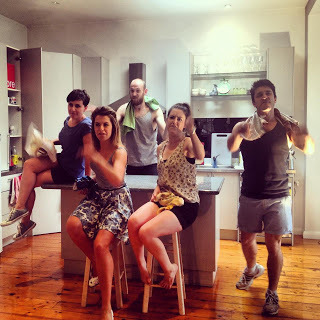
Our cast again. it seems likely that our set will resemble a working kitchen. We have permission to cook stuff during the show. In the last rehearsal I attended, there was much chopping of vegetables and fiddling with pots. It was a little distracting and it will be tidied up for the final production, but I did rather like the fact that at the end of the show, the cast sat and ate what they had made. No food wastage here.
Simon was still kind and supportive, but by this stage he had decided he no longer wanted to perform the role of the MTC's artistic director. So, we had a show but nowhere to present it. It gathered dust for a few years. I showed it to Bryce Ives at some stage and gave him a copy of the CD. I remained in contact with Margaret, and made sure that she got invitations to some of the other Sydney shows in which Ihad played a part. I was glad she came to The Clockwork Forest at the SYdney Theatre Company, because I think that show is the most faithful rendering of my writing. ShHe also saw the Belvoir Street production of Snugglepot and Cuddlepie which I adapted with John Clarke. I remember a ludicrous, plump arts administrator complaining about the script that John and I had written, stating that it was little more than a satire on Australia. This overwhelmed me. If you commission Australia's best known satirist to write a show then complain that it's satirical is a bit like buying a cherry ripe then complaining because there appear to be cherries in it. It wasn't a good experience, because of Sydney theatre politics, though I very much enjoyed working with John.
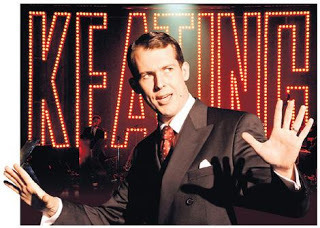
The incomparable Keating, The musical. We were working on the Margaret Fulton show before this mini-masterpiece appeared, and it inspired us.
Simon Phillips was also in the opening night audience of The Clockwork Forest. I did passingly mention to him that I still had this musical about Margaret Fulton who, by an extraordinary coincidence, was holding my hand. I don't know if Simon had lost interest in the project, but he moved away to chat with a painting. Margaret joined me at the bar. I should have bought Margaret a whiskey and water as I know this is her preferred tipple, but we both downed some white wine while I was eager to hear what Margaret thought of the show. She said that the design was very good - and it was. But, of course, it's not what the writer wants to hear. In the end, Margaret said something polite and kind about the script and I farewelled her as she climbed into a cab and rode back to Balmain.
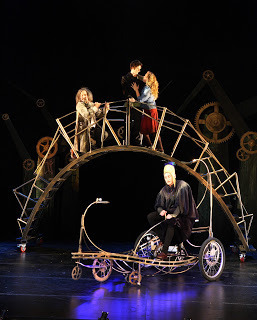
The elegant Brink/STC production of THe Clockwork Forest.
What happened next is I had a stroke. I woke up one morning unable to feel any sensation in my hands, except for a sort of pins and needles feeling in my fingertips. I couldn't talk properly because my mouth drooped down on the left side and I seemed to have developed a slight limp. I journeyed to the local medical centre and they were very adamant that I had to get to a hospital as soon as possible. I really didn't believe I was having a stroke. TO me, my voice sounded fairly normal, though I've since been assured that it didn't. I spent a few weeks in hospital, and when I was discharged I looked around for something to do. There was a book I wanted to write, and I've blogged about that elsewhere. I was at a bit of a loose end when Bryce Ives rang, as enthusiastic as ever, saying that he definitely wanted to get the Margaret Fulton musical happening and that there might even be some funding from Port Philip Council and local company Theatreworks. All I had to do was finish it.
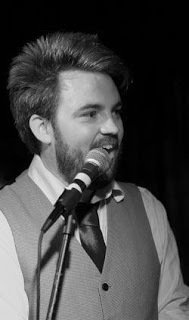 Director Bryce Ives, very much at home with a microphone.
Director Bryce Ives, very much at home with a microphone. Yuri Worontscak and I signed on, and Yuri patiently helped me with all of the new songs we had to write. (I thought that a quick way of writing songs would be to compose new words to fit already establish melodies, but fortunately Yuri didn't like that idea. He was very good at doing 'soundalikes' and had gained a reputation for doing the song parodies on shows like Fast Forward and Full Frontal. His work sounded just different enough from the original to keep him out of the law courts. But Yuri was keen to write some brand new stuff, not the old soundalikes. We worked hard on eighteen more songs. (When you've had a stroke, it's a good idea to work with a friend, because the chances are you'll come up with some stupid ideas, and only a good friend would be brave enough to point out just how abysmally stupid those ideas are.) Bryce kept on at me to finish the script, so he could cast. I decided that whoever played the lead had to be a comic performer, not just a singer, because there were quite a few jokes in the show. Eventually we had a table reading of the script in the dungeons of the old National Theatre in St Kilda. I recognised a few faces from the old Call Girl prduction - choreographer David Harford and singer comedianne Laura Burzacott. Laura was a perfect fit for the show and did such a good job reading a Rocks character called Bea that I immediately went off and wrote a lot more scenes for her.
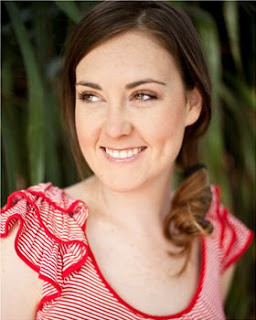
The amazing Laura Burzacott who will be playing the role of Bea in the show. I don't see how someone so talented can seemingly appear out of nowhere. She hasn't taken a singing lesson in her life, but she has perfect pitch and can give the songs a lot of energy. Though I irritate her when I make the lyrics too wordy.
Gina Riley was unavailable to play Margaret Fulton, on the grounds that she'd just made a movie that she was rather keen to promote (I'd worked on the same movie, so I understood.) Wendy Harmer said she was interested, and for a while it looked as though Wendy would be Margaret Fulton, but there was a clash with another big TV gig she was doing. Neither Gina nor Wendy had complained about the pathetically low remuneration we were offering. Maybe they were just being polite? But I think they were genuinely interested in playing such a wonderful cahracter as Margaret. There aren't that many Australian musicals with such a strong female character. Eventually Bryce cast Amy Lehpamer, as he'd just seen her in the retro musical Rock of Ages and she'd been very good.
The rest of the cast sort of fell into place. Both Laura and Bryce could make a good living as talent scouts. They seem to know everyone funny and musical and - gasp! - affordable, working on the fringes of Melbourne Theatre. Producer Sean Bryan came on board to help Bryce and organise funding drives. He's young, but has an incredible list of credits from working on shows all over the world.
:
 Sean Bryan seeking donations for Margaret Fulton Queen of the Dessert. How could you say no to this face?
Sean Bryan seeking donations for Margaret Fulton Queen of the Dessert. How could you say no to this face?The script and songs have been through countless rewrites. We manage to cover three decades of Australian history from 1988 on. We sing cautious love songs about pressure cookers and - recently removed - a song that refers to Margaret Fulton's brief flirtation with the communist party in Australia in the fifties. I thought it so surprising the Margaret, who to me represented a fairly comfortable, domestic cosiness should be involved in leftist politics, that I wanted to call the show Margaret Fulton: Communist. But Margaret didn't like that idea at all. She joined the party when she agreed with communism's more noble ideals of nobody being forced into poverty, but Margaret later told me that Stalin had let her down very badly, and that Russia was the one country she was never likely to visit. Yuri came up with the eventual show name Margaret Fulton - Queen of the Dessert. So that's what it's called, for the moment. One of the best songs in the show is about jam, which was Margaret's solution to a huge Australian sugar surplus, thanks to some overly generous subsidies from the Menzies Government to cane farmers. This song was also on the original presentation CD. I now want to call the show Margaret Fulton's Jam, since that seems to trip off the tongue nicely. If we do ever get the show to Sydney, I'd hope that the same cast and crew could be involved, since we all worked together to make the idea of the Fulton show a reality. But first we have to get through our premiere season at Theatreworks in St Kilda.
Heartfelt thanks to anyone who donated to the project via the Pozible site. See you there!
Published on November 06, 2012 15:17
October 20, 2012
Complications
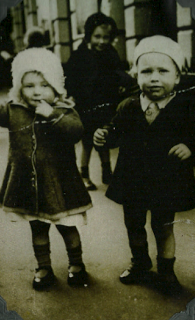 Dad eating chocolate with his twin sister Florence, about seventy years ago. Chocolate consumption was to become a lifelong hobby.
Dad eating chocolate with his twin sister Florence, about seventy years ago. Chocolate consumption was to become a lifelong hobby.My dad's heart operation went okay and he has been transported from Geelong to a hospital in Ballarat. But we now have another problem. Dad managed to get a stroke (just like me), so now we can talk with each other about the experience. I think that, generally, dads get strokes long before their sons, so this is an interesting inversion. He felt very sick in the middle of the week and when I learned the symptoms, I actually knew what was wrong. (I know so few things about the world that I am delighted and staggered when I can offer some advice borne of experience.) Dad's on the same bloodpressure-lowering drug that am. It's called Karvea, and I found that it made me feel sick and incredibly sleepy, because my dosage was too high and my blood pressure had dropped below a hundred, where it had been just over two hundred, prior to treatment. Dad was experiencing exactly the same thing as I did, and I suspected for the same reason. I wonder what the correct protocol is, when you are pretty sure you know what is wrong with a patient but have had no medical training? Should you seek the attention of a nurse and tell them what you think is wrong with the patient and why? From experience, medical staff hate this sort of intervention, as much as a writer would hate someone telling him what's wrong with the words he has written, by someone who hasn't ever written a book in their life. But hang on, that's how my life works. And if the critic is wrong (they usually are) all that happens is I feel miserable for a few hours. I don't actually die. So why be a coward?
In the end, my little sister (who's had quite a lot of experience with medical staffwas brave enough to inform the ward sister that she had a fair idea of what was wrong with Dad, since her stupid and neurotic big brother had just suffered a similar experience. Sniffily, they reduced the dosage of Karvea and Dad felt well again.
Dad can't drive or talk properly and he's always sleepy, but can't sleep. He also finds it hard to read and work. My father and I have more in common than ever. I already love him, but perhaps the
shared stroke will bring us closer together?
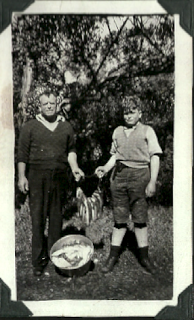 Here is my dad fishing with his dad, a long time ago. Both are probably thinking they will never get cancer or strokes. Both, I regret, are wrong.
Here is my dad fishing with his dad, a long time ago. Both are probably thinking they will never get cancer or strokes. Both, I regret, are wrong.
Published on October 20, 2012 14:02
Musings on Sequels
<!-- /* Font Definitions */ @font-face {font-family:"Times New Roman"; panose-1:0 2 2 6 3 5 4 5 2 3; mso-font-charset:0; mso-generic-font-family:auto; mso-font-pitch:variable; mso-font-signature:50331648 0 0 0 1 0;} /* Style Definitions */ p.MsoNormal, li.MsoNormal, div.MsoNormal {mso-style-parent:""; margin:0cm; margin-bottom:.0001pt; mso-pagination:widow-orphan; font-size:12.0pt; font-family:Courier; color:black; mso-ansi-language:EN-AU;} table.MsoNormalTable {mso-style-parent:""; font-size:10.0pt; font-family:"Times New Roman";} @page Section1 {size:612.0pt 792.0pt; margin:72.0pt 90.0pt 72.0pt 90.0pt; mso-header-margin:36.0pt; mso-footer-margin:36.0pt; mso-paper-source:0;} div.Section1 {page:Section1;} </style> <br /><div class="MsoNormal">It's been a year now since I had the stroke but I'm still finding it very hard to work. If you want to hear how I'm talking at the moment, <a href="http://www.pozible.com/fulton"&g... here</a>. It might sound normal to you, but this is nothing like how I used to speak. By the way, my two friends Amy and YUri did a lot of speaking, even though they do not feature here. There are alternative edits of film, which will be released on facebook.</div><div class="MsoNormal"></div><div class="MsoNormal"><br /></div><div class="MsoNormal"><br /></div><div class="MsoNormal"><div class="separator" style="clear: both; text-align: center;"><a href="http://2.bp.blogspot.com/-QhUdNJAWV6Y..." imageanchor="1" style="margin-left: 1em; margin-right: 1em;"><img border="0" height="320" src="http://2.bp.blogspot.com/-QhUdNJAWV6Y..." width="208" /></a></div><br /></div><div class="MsoNormal"></div><div class="MsoNormal"><br /></div><div class="MsoNormal">Not quite sure where my career will be going next. Writing is punishingly difficult and I'm still not as sturdy on my feet as I would like to be. It was very hard to write the sequel to my Body-snatcher book, and it looks as though Penguin are tentative about publishing it. So they should be, the original received an honour in the CBCA awards and a shortlisting in The Victorian Premier's Awards so obviously the book is a piece of crap that should never have been exhumed. Now I'm in a quandary. It took at least four months to write that sequel. It's about sixty thousand words long. What do I do with it? Is it appropriate to show it other publishers? The manuscript is now in the hands of my personal friend and editor extraordinaire, Dmetri Kakmi. I don't even know if the book is any good, since I wrote it while I was still in rehab from the stroke. I know that dmetri won't hold back with constructive criticism.<br /><br />Meanwhile here is a picture of the glorious Amy Lehpamer (the pretty one in that movie with me plugging the play, who not only has tyhe best pair of legs in the business, but also possesses a stunning voice and will be playing the title character in the musical,<br /><a href="http://www.theatreworks.org.au/whatso..., Queen of the Dessert. </a><br /><br /><div class="separator" style="clear: both; text-align: center;"><a href="http://2.bp.blogspot.com/-qgs8GQulLvs..." imageanchor="1" style="margin-left: 1em; margin-right: 1em;"><img border="0" height="180" src="http://2.bp.blogspot.com/-qgs8GQulLvs..." width="320" /></a></div><br /><br /></div><div class="blogger-post-footer"><img width='1' height='1' src='https://blogger.googleusercontent.com...' alt='' /></div>
Published on October 20, 2012 13:38
September 24, 2012
Dad's Heart
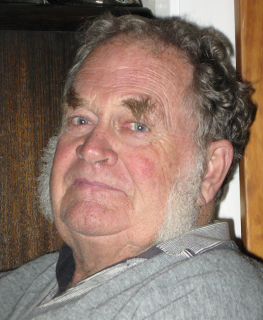 <!-- /* Font Definitions */ @font-face {font-family:"Times New Roman"; panose-1:0 2 2 6 3 5 4 5 2 3; mso-font-charset:0; mso-generic-font-family:auto; mso-font-pitch:variable; mso-font-signature:50331648 0 0 0 1 0;} /* Style Definitions */ p.MsoNormal, li.MsoNormal, div.MsoNormal {mso-style-parent:""; margin:0cm; margin-bottom:.0001pt; mso-pagination:widow-orphan; font-size:12.0pt; font-family:Courier; color:black; mso-ansi-language:EN-AU;} table.MsoNormalTable {mso-style-parent:""; font-size:10.0pt; font-family:"Times New Roman";} @page Section1 {size:595.0pt 842.0pt; margin:72.0pt 90.0pt 72.0pt 90.0pt; mso-header-margin:35.4pt; mso-footer-margin:35.4pt; mso-paper-source:0;} div.Section1 {page:Section1;} </style>--> <br /><div class="MsoNormal">My father has a crook heart. About ten years ago, he went into The Royal Melbourne Hospital to have a quadruple by-pass. I went to visit him, far too soon after the operation, but nurses are often unaware of what<span style="mso-spacerun: yes;"> </span>constitutes a suitable visiting time. If a patient has his/her eyes open and is not screaming with pain, or covered in crap, they consider this patient to be in a perfect state for visitors. After all, they're used to trauma. Thus, when I first saw my father after the bypass operation he was lying on a bed, with a box on top of him. Through this box ran many tubes full of his blood. These tubes were hooked up to various supports, giving him the appearance of an insect trapped in a particularly nasty spider's web. My father did not appreciate having visitors, though he remained courteous.</div><div class="MsoNormal"><br /></div><div class="MsoNormal">His heart has been bad for the past year. He needed a new valve and it would be impossible for doctors to insert said valve without opening up his heart again. Since the loss of my driver's licence, and a particularly stupid moment when I nearly got myself run down by a car that I apparently didn't see (we talked about left side neglect in this blog before) I have become effectively barricaded in St kilda for my own safety. (That sentence is probably one of the strangest you will ever read.) But it's fine to be barricaded in St KIlda. I like the place and I love my partner, so life is pleasant. But I was rather keen to see my father in the Geelong hospital, to see how he was coping with the operation, and possibly even cheer him up. My sister kindly drove me from Melbourne to Geelong.<span style="font-style: normal;"> It was a cheerful enough kourney, my sister and I reliving childhood outrages that might one day be resurrected as books. Then at around four in the afternoon we went to visit dad in the Geelong Hospital. Knowing how inured nurses are to the sometimes disturbing appearance and desire for visitors too soon after their operations, I made certain that Dad would not have a box with bloody tubes resting on his chest. He would be sitting peacefully, in the Intensive Care unit and would probably welcome visitors, I was assured.</span></div><div class="MsoNormal"><br /></div><div class="separator" style="clear: both; text-align: center;"><a href="http://1.bp.blogspot.com/-tdgupA8d8pM..." imageanchor="1" style="margin-left: 1em; margin-right: 1em;"><img border="0" height="240" src="http://1.bp.blogspot.com/-tdgupA8d8pM..." width="320" /></a></div><div class="MsoNormal"><span style="font-style: normal;"></span></div><div class="MsoNormal"><br /></div><div class="MsoNormal">I had forgotten that my father had to be shaved before the operation. He is particularly proud of his big bushy eyebrows (also mentioned elsewhere on this blog, as there is quite a story behind them) and his great muttonchop sideburns. Because the whiskers are something of a trademark, Dad protested and wondered why he would not be allowed to keep them. After all, the sideburns are a fair distance from the heart. The medico to whom Dad complained pointed to a grey hair on his jumpeer. 'That's from your sideburns,' Dad was told. 'If one of those things ends up in your body it could cause an infection.' Dad needed no further persuasion and agreed to losing his sideburns. He has a bad track record when it comes to infection. After every operation he has managed to contact some singularly ugly infections, perhaps caused by stray facial hairs, who knows?</div><div class="MsoNormal"><br /></div><div class="MsoNormal">THe ward sister gave me the number of the bed. I knew that the little character sitting next to it must have been my father. But it diudn't look like him. The scale was all wrong. Sitting in the chair beside the bed was a poor little soul who seemed half the size of my father, like one of those Ron Mueck sculptures that play with our perceptions of size and the human body. He was on several drips and he was indeed sitting upright. But his eyes were closed and his face bore the expression of someone who was doing battle with invisible demons. My sister and I both kissed him and patted his hand, then left him, saying we would be back the next day. I suspect he didn't hear.</div><div class="MsoNormal"><br /></div><div class="separator" style="clear: both; text-align: center;"><a href="http://3.bp.blogspot.com/-x0UMH_Z4LSY..." imageanchor="1" style="margin-left: 1em; margin-right: 1em;"><img border="0" height="240" src="http://3.bp.blogspot.com/-x0UMH_Z4LSY..." width="320" /></a></div><div style="text-align: center;">My father loves steam engines as, I suspect, most fathers do. </div><div class="MsoNormal"> </div><div class="MsoNormal"><br /></div><div class="MsoNormal">I have just written a novel about a family coming to terms with the death of a beloved father. My favourite editor, Dmetri Kakmi, on his first read-through, suggested that I had allowed too long a period of mourning. I had allowed six months, but Dmetri said that a mere few weeks would be more believable. Dmetri recently lost his mother so he can speak from personal experience. But as I left the hospital I thought of what my world would be like if Dad didn't pull through. Dad was always the one who encouraged me when I made up my mind to be a professional writer. He always told the best stories, and we three kids would marvel as he read us bedtime stories. Dad, you see, had been more or less ordered by Mum to read the books that she had liked and that meant something to her. So it was that we discovered the world of Winnie The Pooh at about the same time that <i>Dad</i><span style="font-style: normal;"> did. He was a good reader, very theatrical.</span></div><div class="MsoNormal"><br /></div><div class="MsoNormal"><br /></div><div class="separator" style="clear: both; text-align: center;"><a href="http://4.bp.blogspot.com/-_0hG9HS94kQ..." imageanchor="1" style="margin-left: 1em; margin-right: 1em;"><img border="0" height="320" src="http://4.bp.blogspot.com/-_0hG9HS94kQ..." width="293" /></a></div><div class="separator" style="clear: both; text-align: center;"><br /></div><div class="MsoNormal"></div><div class="MsoNormal"><br /></div><div class="MsoNormal"><span style="font-style: normal;"> And somehow he could remember all the different voices he had created for the inhabitants of The Hundred Aker Wood. We liked his Eeyore voice the best. I think his enthusiasm for 'the books that Mum liked' might well be the reason why I was determined to become a book writer myself. I never really doubted that that's what I would be. My parents were worried about this and thought that such a career choice might lead to penury. They spoke with a writer friend of mine, Michael Dugan, about whether it was possible to make a living from writing stories and Michael told them that it was, although it might not necessarily be a posh living. My parents had no great fondness for poshness or 'putting on side' as my grandmother used to put it, even though she often did pretend to be posh, saying 'rum' instead of 'room' or 'hom' instead of 'home'. But MUm and Dad were not snobs. Dad worked at the Melbourne docks and later landed an office job at Australian Paper Manufacturers, and Mum made extra money working for a printer in West Heidelberg, where we lived. It had never occurred to me that West Heidelberg wasn't a 'nice' place to live. But then I managed to win a scholarship to a very fine school in Kew, which meant I could escape the truly shithouse state school that I attended (Maryvale High in Morwell, just before we moved back to Melbourne). My new schoolfriends had me over to their places, but when I returned the favour I could see the looks of confusion and maybe even disgust on their faces. It got around Carey fairly quickly that I lived in a crappy house and that my parents both drove cars that were complete bombs. I had finally learned about the class system, and it had taken me so long because most of ther other schools I had attended were fairly run-of-the-mill, and absolutely no one 'put on side'.</span></div><div class="MsoNormal">Dad had left school at fourteen, as was the done thing in working class families because the teenagers had to make money to support the family as soon as they were able. I wonder what would have happened if Dad had stayed at school abnd maybe gone on to get a tertiary education. He was a bright man, I knew that. He also knew a fair bit about classical music, though the reason why speaks volumes about his logic. When those thick black 78rpm records were first made available in the shops, and every home had a gramophone, Dad would buy a record a week from some of the money he earned through working at docks. He didn't particularly like classical music, but his logic was that contemporary music would go out of fashion and the records would become worthless, but classical music never wenr After all it had lasted for centuries. Unfortunately Dad had not figured technological advances intio the equation. Try getting a 78 to play on a CD player.</div><div class="MsoNormal"><br /></div><div class="MsoNormal">I have an image of my Dad taking the bus to work and reading one of 'Mum's books'. Dad was a fairly stocky man, but he wasn't quite comfortable about being seen reading a kids' book, or whatever volume Mum had handed him in her quest to 'improve him'. It was nothing of the sort, of course. Mum just wanted to talk with someone about the books, as she had done with her own mum and friends. So, Dad would make blank covers out of brown paper and wrap them around the books, so that no one could tell he was reading <i>The Wind in the Willows</i><span style="font-style: normal;"><i> </i>or </span>Now We Are Six<span style="font-style: normal;"> or whatever. BAak then, books in plain brown wrappers were regarded with suspicion as they were usually pornographic. Given that most men on the bus would have been reading sexy James Bond novels, they would no doubt have been curious about what saucy book Dad was reading. I'm sure that those who peered over his shoulder would have been perplexed to read, 'Here is Edward Bear, coming downstairs now, bump, bump, bump, on the back of his head, behind Christopher Robin. It is, as far as he knows, the only way of coming downstairs, but sometimes he feels that there really is another way, if only he could stop bumping for a moment and think of it.'</span></div><div class="MsoNormal"><br /></div><div class="MsoNormal">Dad had introduced me to all those wonderful books that Mum liked. Even though Mum could read aloud very well and had even done it on the wireless, we preferred it when Dad read the stories because he put so much effort into doing the voices, and he would laugh as if he had only just got the joke, which might well have been the case. As we kids grew older, Daf introduced us to other books, the ones he <span style="font-style: normal;">liked. I remember one of the first 'adult' books I read was<i> </i></span><i>The Black Cloud</i><span style="font-style: normal;"><i> </i>by Fred Hoyle. </span></div><div class="MsoNormal"><br /></div><div class="separator" style="clear: both; text-align: center;"><a href="http://1.bp.blogspot.com/-LCU5M3kulbo..." imageanchor="1" style="margin-left: 1em; margin-right: 1em;"><img border="0" height="320" src="http://1.bp.blogspot.com/-LCU5M3kulbo..." width="208" /></a></div><div class="MsoNormal"><span style="font-style: normal;">It was a smashing science fiction story where the people of earth had to learn how to communicate with a giant approaching cloud that seemed to have less-than-benign intentions towards our small blue planet. It started me on a lifelong appreciation of science fiction stories. A book about malevolent clouds can do that to a person. Then I got hold of </span><i>The Day of the Triffids </i>(not sure if this was Dad's book or from the school library)<i> </i><span style="font-style: normal;">but that one was was a science fiction fan's dream; a smart, original plot, situations we could recognise or identify with, and a relentless energy that meant you really couldn't put the book down. I remember discussing with Dad about whether the earth might really be subjugated by human-eating plants one day. He didn't discount the possibility. After all, we were about to put a man on the moon. I was, of course, a complete Apollo 11 nerd.</span></div><div class="MsoNormal"><br /></div><div class="separator" style="clear: both; text-align: center;"><a href="http://3.bp.blogspot.com/-1wP-y_pcVRk..." imageanchor="1" style="margin-left: 1em; margin-right: 1em;"><img border="0" height="244" src="http://3.bp.blogspot.com/-1wP-y_pcVRk..." width="320" /></a></div><div style="text-align: center;">The crew of Apollo 11. I always identified with Michael Collins, the guy in the middle. HE flew all the way to the moon, but he didn't land on it because he had to remain behind, orbiting in the command module Columbia. MIchael Collins, I am you. Always orbiting on the outskirts but never at the centre of things.</div><div class="MsoNormal"><br /></div><div class="MsoNormal"><span style="font-style: normal;"> </span></div><div class="MsoNormal"><br /></div><div class="MsoNormal"><span style="font-style: normal;">I had a model of the Eagle on my bedhead. Dad even bought me special postage stamps from Yemen, which depicted Columbia the command module, and of course Eagle, the lunar module. These stamps were lenticular: a word I have only recently learned that describes a sort of hard-copy 3D. (A lot of box-set DVD's feature them.) Those stamps, about the size of playing cards, were the coolest things I ever saw, and Dad knew that I would be just crazy about them. They've gone now, sold in a jumble sale during a lapse of judgment. I also had chemistry sets that were positively dangerous, so I was allowed to play with them only when Dad was around. Anyway, he was the one who ended up committing a scientific snafu when he lit some gunpowder and blew off his eyebrows (as well as mine, as it happens. His grew back, mine never did).</span></div><div class="MsoNormal"><br /></div><div class="MsoNormal">When my sister and I returned to Geelong hospital the next day, Dad was out of the intensive care unit and in a ward with three other beds. His whiskers hadn't miraculously grown back overnight, but somehow he seemed to have returned to his correct size as he sat up in bed, looking much more like the dad of old. Two days ago, someone had been opening him up and fiddling around with his heart. I hoped to god there were no stray hairs. Anyway, it was all pretty serious stuff, so perhaps I was asking too much of my father to appear more Dad-like when I'd seen him just the day before. He chatted and made jokes. He has always been able to make good jokes, or tell good stories just like his own father. I think it might be a Scottish trait.</div><div class="MsoNormal"><br /></div><div class="MsoNormal">I have to accept it probably isn't likely that my father will survive another big operation like this - and he's already had a few. But with all due respect, Dmetri, I can't imagine the period of mourning being a few short weeks.</div><div class="MsoNormal"><br /></div><div class="separator" style="clear: both; text-align: center;"><a href="http://2.bp.blogspot.com/-47uj6d08EXs..." imageanchor="1" style="margin-left: 1em; margin-right: 1em;"><img border="0" height="320" src="http://2.bp.blogspot.com/-47uj6d08EXs..." width="240" /></a></div><div class="MsoNormal"><br /></div><div class="blogger-post-footer"><img width='1' height='1' src='https://blogger.googleusercontent.com...' alt='' /></div>
<!-- /* Font Definitions */ @font-face {font-family:"Times New Roman"; panose-1:0 2 2 6 3 5 4 5 2 3; mso-font-charset:0; mso-generic-font-family:auto; mso-font-pitch:variable; mso-font-signature:50331648 0 0 0 1 0;} /* Style Definitions */ p.MsoNormal, li.MsoNormal, div.MsoNormal {mso-style-parent:""; margin:0cm; margin-bottom:.0001pt; mso-pagination:widow-orphan; font-size:12.0pt; font-family:Courier; color:black; mso-ansi-language:EN-AU;} table.MsoNormalTable {mso-style-parent:""; font-size:10.0pt; font-family:"Times New Roman";} @page Section1 {size:595.0pt 842.0pt; margin:72.0pt 90.0pt 72.0pt 90.0pt; mso-header-margin:35.4pt; mso-footer-margin:35.4pt; mso-paper-source:0;} div.Section1 {page:Section1;} </style>--> <br /><div class="MsoNormal">My father has a crook heart. About ten years ago, he went into The Royal Melbourne Hospital to have a quadruple by-pass. I went to visit him, far too soon after the operation, but nurses are often unaware of what<span style="mso-spacerun: yes;"> </span>constitutes a suitable visiting time. If a patient has his/her eyes open and is not screaming with pain, or covered in crap, they consider this patient to be in a perfect state for visitors. After all, they're used to trauma. Thus, when I first saw my father after the bypass operation he was lying on a bed, with a box on top of him. Through this box ran many tubes full of his blood. These tubes were hooked up to various supports, giving him the appearance of an insect trapped in a particularly nasty spider's web. My father did not appreciate having visitors, though he remained courteous.</div><div class="MsoNormal"><br /></div><div class="MsoNormal">His heart has been bad for the past year. He needed a new valve and it would be impossible for doctors to insert said valve without opening up his heart again. Since the loss of my driver's licence, and a particularly stupid moment when I nearly got myself run down by a car that I apparently didn't see (we talked about left side neglect in this blog before) I have become effectively barricaded in St kilda for my own safety. (That sentence is probably one of the strangest you will ever read.) But it's fine to be barricaded in St KIlda. I like the place and I love my partner, so life is pleasant. But I was rather keen to see my father in the Geelong hospital, to see how he was coping with the operation, and possibly even cheer him up. My sister kindly drove me from Melbourne to Geelong.<span style="font-style: normal;"> It was a cheerful enough kourney, my sister and I reliving childhood outrages that might one day be resurrected as books. Then at around four in the afternoon we went to visit dad in the Geelong Hospital. Knowing how inured nurses are to the sometimes disturbing appearance and desire for visitors too soon after their operations, I made certain that Dad would not have a box with bloody tubes resting on his chest. He would be sitting peacefully, in the Intensive Care unit and would probably welcome visitors, I was assured.</span></div><div class="MsoNormal"><br /></div><div class="separator" style="clear: both; text-align: center;"><a href="http://1.bp.blogspot.com/-tdgupA8d8pM..." imageanchor="1" style="margin-left: 1em; margin-right: 1em;"><img border="0" height="240" src="http://1.bp.blogspot.com/-tdgupA8d8pM..." width="320" /></a></div><div class="MsoNormal"><span style="font-style: normal;"></span></div><div class="MsoNormal"><br /></div><div class="MsoNormal">I had forgotten that my father had to be shaved before the operation. He is particularly proud of his big bushy eyebrows (also mentioned elsewhere on this blog, as there is quite a story behind them) and his great muttonchop sideburns. Because the whiskers are something of a trademark, Dad protested and wondered why he would not be allowed to keep them. After all, the sideburns are a fair distance from the heart. The medico to whom Dad complained pointed to a grey hair on his jumpeer. 'That's from your sideburns,' Dad was told. 'If one of those things ends up in your body it could cause an infection.' Dad needed no further persuasion and agreed to losing his sideburns. He has a bad track record when it comes to infection. After every operation he has managed to contact some singularly ugly infections, perhaps caused by stray facial hairs, who knows?</div><div class="MsoNormal"><br /></div><div class="MsoNormal">THe ward sister gave me the number of the bed. I knew that the little character sitting next to it must have been my father. But it diudn't look like him. The scale was all wrong. Sitting in the chair beside the bed was a poor little soul who seemed half the size of my father, like one of those Ron Mueck sculptures that play with our perceptions of size and the human body. He was on several drips and he was indeed sitting upright. But his eyes were closed and his face bore the expression of someone who was doing battle with invisible demons. My sister and I both kissed him and patted his hand, then left him, saying we would be back the next day. I suspect he didn't hear.</div><div class="MsoNormal"><br /></div><div class="separator" style="clear: both; text-align: center;"><a href="http://3.bp.blogspot.com/-x0UMH_Z4LSY..." imageanchor="1" style="margin-left: 1em; margin-right: 1em;"><img border="0" height="240" src="http://3.bp.blogspot.com/-x0UMH_Z4LSY..." width="320" /></a></div><div style="text-align: center;">My father loves steam engines as, I suspect, most fathers do. </div><div class="MsoNormal"> </div><div class="MsoNormal"><br /></div><div class="MsoNormal">I have just written a novel about a family coming to terms with the death of a beloved father. My favourite editor, Dmetri Kakmi, on his first read-through, suggested that I had allowed too long a period of mourning. I had allowed six months, but Dmetri said that a mere few weeks would be more believable. Dmetri recently lost his mother so he can speak from personal experience. But as I left the hospital I thought of what my world would be like if Dad didn't pull through. Dad was always the one who encouraged me when I made up my mind to be a professional writer. He always told the best stories, and we three kids would marvel as he read us bedtime stories. Dad, you see, had been more or less ordered by Mum to read the books that she had liked and that meant something to her. So it was that we discovered the world of Winnie The Pooh at about the same time that <i>Dad</i><span style="font-style: normal;"> did. He was a good reader, very theatrical.</span></div><div class="MsoNormal"><br /></div><div class="MsoNormal"><br /></div><div class="separator" style="clear: both; text-align: center;"><a href="http://4.bp.blogspot.com/-_0hG9HS94kQ..." imageanchor="1" style="margin-left: 1em; margin-right: 1em;"><img border="0" height="320" src="http://4.bp.blogspot.com/-_0hG9HS94kQ..." width="293" /></a></div><div class="separator" style="clear: both; text-align: center;"><br /></div><div class="MsoNormal"></div><div class="MsoNormal"><br /></div><div class="MsoNormal"><span style="font-style: normal;"> And somehow he could remember all the different voices he had created for the inhabitants of The Hundred Aker Wood. We liked his Eeyore voice the best. I think his enthusiasm for 'the books that Mum liked' might well be the reason why I was determined to become a book writer myself. I never really doubted that that's what I would be. My parents were worried about this and thought that such a career choice might lead to penury. They spoke with a writer friend of mine, Michael Dugan, about whether it was possible to make a living from writing stories and Michael told them that it was, although it might not necessarily be a posh living. My parents had no great fondness for poshness or 'putting on side' as my grandmother used to put it, even though she often did pretend to be posh, saying 'rum' instead of 'room' or 'hom' instead of 'home'. But MUm and Dad were not snobs. Dad worked at the Melbourne docks and later landed an office job at Australian Paper Manufacturers, and Mum made extra money working for a printer in West Heidelberg, where we lived. It had never occurred to me that West Heidelberg wasn't a 'nice' place to live. But then I managed to win a scholarship to a very fine school in Kew, which meant I could escape the truly shithouse state school that I attended (Maryvale High in Morwell, just before we moved back to Melbourne). My new schoolfriends had me over to their places, but when I returned the favour I could see the looks of confusion and maybe even disgust on their faces. It got around Carey fairly quickly that I lived in a crappy house and that my parents both drove cars that were complete bombs. I had finally learned about the class system, and it had taken me so long because most of ther other schools I had attended were fairly run-of-the-mill, and absolutely no one 'put on side'.</span></div><div class="MsoNormal">Dad had left school at fourteen, as was the done thing in working class families because the teenagers had to make money to support the family as soon as they were able. I wonder what would have happened if Dad had stayed at school abnd maybe gone on to get a tertiary education. He was a bright man, I knew that. He also knew a fair bit about classical music, though the reason why speaks volumes about his logic. When those thick black 78rpm records were first made available in the shops, and every home had a gramophone, Dad would buy a record a week from some of the money he earned through working at docks. He didn't particularly like classical music, but his logic was that contemporary music would go out of fashion and the records would become worthless, but classical music never wenr After all it had lasted for centuries. Unfortunately Dad had not figured technological advances intio the equation. Try getting a 78 to play on a CD player.</div><div class="MsoNormal"><br /></div><div class="MsoNormal">I have an image of my Dad taking the bus to work and reading one of 'Mum's books'. Dad was a fairly stocky man, but he wasn't quite comfortable about being seen reading a kids' book, or whatever volume Mum had handed him in her quest to 'improve him'. It was nothing of the sort, of course. Mum just wanted to talk with someone about the books, as she had done with her own mum and friends. So, Dad would make blank covers out of brown paper and wrap them around the books, so that no one could tell he was reading <i>The Wind in the Willows</i><span style="font-style: normal;"><i> </i>or </span>Now We Are Six<span style="font-style: normal;"> or whatever. BAak then, books in plain brown wrappers were regarded with suspicion as they were usually pornographic. Given that most men on the bus would have been reading sexy James Bond novels, they would no doubt have been curious about what saucy book Dad was reading. I'm sure that those who peered over his shoulder would have been perplexed to read, 'Here is Edward Bear, coming downstairs now, bump, bump, bump, on the back of his head, behind Christopher Robin. It is, as far as he knows, the only way of coming downstairs, but sometimes he feels that there really is another way, if only he could stop bumping for a moment and think of it.'</span></div><div class="MsoNormal"><br /></div><div class="MsoNormal">Dad had introduced me to all those wonderful books that Mum liked. Even though Mum could read aloud very well and had even done it on the wireless, we preferred it when Dad read the stories because he put so much effort into doing the voices, and he would laugh as if he had only just got the joke, which might well have been the case. As we kids grew older, Daf introduced us to other books, the ones he <span style="font-style: normal;">liked. I remember one of the first 'adult' books I read was<i> </i></span><i>The Black Cloud</i><span style="font-style: normal;"><i> </i>by Fred Hoyle. </span></div><div class="MsoNormal"><br /></div><div class="separator" style="clear: both; text-align: center;"><a href="http://1.bp.blogspot.com/-LCU5M3kulbo..." imageanchor="1" style="margin-left: 1em; margin-right: 1em;"><img border="0" height="320" src="http://1.bp.blogspot.com/-LCU5M3kulbo..." width="208" /></a></div><div class="MsoNormal"><span style="font-style: normal;">It was a smashing science fiction story where the people of earth had to learn how to communicate with a giant approaching cloud that seemed to have less-than-benign intentions towards our small blue planet. It started me on a lifelong appreciation of science fiction stories. A book about malevolent clouds can do that to a person. Then I got hold of </span><i>The Day of the Triffids </i>(not sure if this was Dad's book or from the school library)<i> </i><span style="font-style: normal;">but that one was was a science fiction fan's dream; a smart, original plot, situations we could recognise or identify with, and a relentless energy that meant you really couldn't put the book down. I remember discussing with Dad about whether the earth might really be subjugated by human-eating plants one day. He didn't discount the possibility. After all, we were about to put a man on the moon. I was, of course, a complete Apollo 11 nerd.</span></div><div class="MsoNormal"><br /></div><div class="separator" style="clear: both; text-align: center;"><a href="http://3.bp.blogspot.com/-1wP-y_pcVRk..." imageanchor="1" style="margin-left: 1em; margin-right: 1em;"><img border="0" height="244" src="http://3.bp.blogspot.com/-1wP-y_pcVRk..." width="320" /></a></div><div style="text-align: center;">The crew of Apollo 11. I always identified with Michael Collins, the guy in the middle. HE flew all the way to the moon, but he didn't land on it because he had to remain behind, orbiting in the command module Columbia. MIchael Collins, I am you. Always orbiting on the outskirts but never at the centre of things.</div><div class="MsoNormal"><br /></div><div class="MsoNormal"><span style="font-style: normal;"> </span></div><div class="MsoNormal"><br /></div><div class="MsoNormal"><span style="font-style: normal;">I had a model of the Eagle on my bedhead. Dad even bought me special postage stamps from Yemen, which depicted Columbia the command module, and of course Eagle, the lunar module. These stamps were lenticular: a word I have only recently learned that describes a sort of hard-copy 3D. (A lot of box-set DVD's feature them.) Those stamps, about the size of playing cards, were the coolest things I ever saw, and Dad knew that I would be just crazy about them. They've gone now, sold in a jumble sale during a lapse of judgment. I also had chemistry sets that were positively dangerous, so I was allowed to play with them only when Dad was around. Anyway, he was the one who ended up committing a scientific snafu when he lit some gunpowder and blew off his eyebrows (as well as mine, as it happens. His grew back, mine never did).</span></div><div class="MsoNormal"><br /></div><div class="MsoNormal">When my sister and I returned to Geelong hospital the next day, Dad was out of the intensive care unit and in a ward with three other beds. His whiskers hadn't miraculously grown back overnight, but somehow he seemed to have returned to his correct size as he sat up in bed, looking much more like the dad of old. Two days ago, someone had been opening him up and fiddling around with his heart. I hoped to god there were no stray hairs. Anyway, it was all pretty serious stuff, so perhaps I was asking too much of my father to appear more Dad-like when I'd seen him just the day before. He chatted and made jokes. He has always been able to make good jokes, or tell good stories just like his own father. I think it might be a Scottish trait.</div><div class="MsoNormal"><br /></div><div class="MsoNormal">I have to accept it probably isn't likely that my father will survive another big operation like this - and he's already had a few. But with all due respect, Dmetri, I can't imagine the period of mourning being a few short weeks.</div><div class="MsoNormal"><br /></div><div class="separator" style="clear: both; text-align: center;"><a href="http://2.bp.blogspot.com/-47uj6d08EXs..." imageanchor="1" style="margin-left: 1em; margin-right: 1em;"><img border="0" height="320" src="http://2.bp.blogspot.com/-47uj6d08EXs..." width="240" /></a></div><div class="MsoNormal"><br /></div><div class="blogger-post-footer"><img width='1' height='1' src='https://blogger.googleusercontent.com...' alt='' /></div>
Published on September 24, 2012 19:33
Dad's Heart

My father has a crook heart. About ten years ago, he went into The Royal Melbourne Hospital to have a quadruple by-pass. I went to visit him, far too soon after the operation, but nurses are often unaware of what constitutes a suitable visiting time. If a patient has his/her eyes open and is not screaming with pain or covered in crap, they may consider this patient to be in a perfect state for visitors. Thus, when I first saw my father after the bypass operationm he was lying on a bed, with a box on top of him. Through this box ran many tubes full of my dad's blood. These tubes were hooked up to various supports, giving him the appearance of an insect trapped in a giant cyber-spider's web. Dad did not particularly want visitors.
His heart has been bad for the past year. He needed a new valve and it would be impossible for doctors to insert said valve without opening up his heart again. Since the loss of my driver's licence, and a particularly stupid moment when I nearly got myself run down by a car that I apparently didn't see (we talked about left side neglect in this blog before) I have become effectively St Kilda-bound, for my own safety. (That is probably one of the strangest sentences you will ever read.) It's hard for me to get out. This is fine. I like St Kilda and I love my partner, so life is pleasant. But I was rather keen to see my father in the Geelong hospital, to see how he was coping with the operation. My sister drove me from Melbourne to Geelong. It was her birthday and I had given her two original Craig Smith illustrations from the book she inspired: Heather Fell In the Water . I also gave her about ten copies of the book. There are far more children in her life than there are in mine, so the books are of more use to her than me. It was a cheerful enough drive to Geelong, my sister and I reliving childhood outrages that could well become books one day. Then, at around four in the afternoon, we went to visit Dad in the Geelong hospital. Knowing how inured nurses are to the sometimes disturbing appearance of patients too soon after their operations, I made certain that Dad would not have a box with bloody tubes resting on his chest. He would be sitting peacefully, in the IC unit, looking forward to visitors, I was promised.
I had forgotten that my father had to be shaved before the operation. He is particularly proud of his big bushy eyebrows (also mentioned elsewhere on this blog, as there is quite a story behind them) and his great muttonchop sideburns. Because the whiskers are something of a trademark, Dad protested and wondered why he would not be allowed to keep them. After all, the sideburns are a fair distance from the heart. The medico to whom Father complained pointed to a grey hair on his jumper. 'That's from your sideburns,' Dad was told. 'If one of those things ends up in your body it could cause an infection.' Dad needed no further persuasion and agreed to losing the facial hair. He has a bad track record when it comes to infection. After every operation he has managed to contract some singularly ugly infections, perhaps caused by stray facial hairs, who knows?
The ward sister assured us that Dad was 'decent', sitting up and might indeed enjoy a visit. They gave us the number of the bed. I knew that the little character we found sitting next to it must have been my father. But it didn't look like him at all. The scale was all wrong. Sitting in the chair beside the bed was a poor little soul who seemed half the size of my father, like one of those Ron Mueck sculptures that play with our perceptions of size and the human body. He was on several drips and he was indeed sitting upright. But his eyes were closed and his face bore the expression of someone doing battle with invisible demons. My sister and I both kissed him and patted his hand, then left him, saying we would be back the next day.
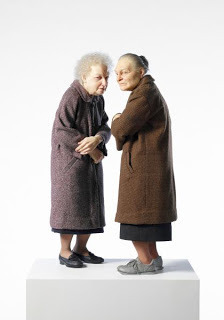 Some of Ron Mueck's work. (I knew him when he had his hand up the puppets on Shirl's Neighbourhood.)
Some of Ron Mueck's work. (I knew him when he had his hand up the puppets on Shirl's Neighbourhood.)I have just written a novel about a family coming to terms with the death of a beloved father. My favourite editor Dmetri Kakmi, on his first read-through, suggested that I had allowed too long a period of mourning. I had allowed six months, but Dmetri said that a mere few weeks would be more appropriate. Dmetri recently lost his mother so he can speak from personal experience. But as I left the hospital I thought of what my world would be like if Dad didn't pull through. Dad was always the one who encouraged me when I made up my mind to be a professional writer. He always told the best stories, and we three kids would marvel as he read us bedtime stories. Dad, you see, had been more or less ordered by Mum to read the books that she had liked and that meant something to her. So it was that we discovered the world of Winnie The Pooh at about the same time that he did. He was a good reader, very theatrical.
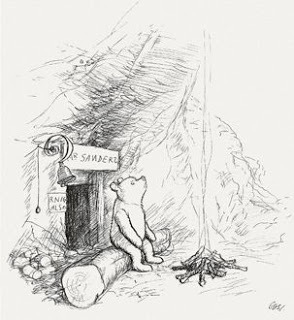
And somehow he could remember all the different voices he had created for the inhabitants of The Hundred Aker Wood. I think his enthusiasm for 'the books that Mum liked' might well be the reason why I was determined to become a book writer myself. I never really doubted that that's what I would be. My parents were worried about this and thought that such a career choice might lead to penury. They spoke with a writer friend of mine, Michael Dugan, about whether it was possible to make a living from writing stories and Michael told them that it was, although it might not necessarily be a posh living. My parents had no great fondness for poshness or 'putting on side' as my grandmother used to put it. They were not snobs. Dad worked an office job at Australian Paper Manufacturers, and Mum made extra money working for a printer in West Heidelberg, where we lived. It had never occurred to me that West HEidelberg wasn't a 'nice' place to live. But then I managed to win a scholarship to a very fine private school in Kew. My friends had me over to their places, but when I returned the favour I could see the looks of confusion and maybe even disappointment on their faces. It got around Carey fairly quickly that I lived in a house that was a dump, and that my parents both drove cars that were complete bombs. I had finally learned about the class system, and it had taken me so long because most of the other schools I had attended were fairly run-of-the-mill, and absolutely no one 'put on side'.Dad had left school at fourteen, as was the done thing in working class families because the teenagers had to make money to support the family as soon as they were able. I wonder what would have happened if Dad had stayed at school and maybe gone on to get a tertiary education. He was a bright man, I knew that. He also knew a fair bit about classical music, though the reason why speaks volumes about his character. When those thick black 78rpm records were first made available in the shops, and every home had a gramophone, Dad would buy a record a week from some of the money he earned through working at The Melbourne Harbor Trust. The records were always classical music because Dad figured that contemporary music would go out of style, so the records would lose their value, but classical music never went out of style. Dad didn't factor technological changes into the equation. Try sticking a 78 into a CD player. I have an image of my Dad taking the bus to work at the docks and reading one of 'Mum's books'. Dad was a fairly stocky man, but he wasn't quite comfortable about being seen reading a kids' book, or whatever volume Mum had handed him in her well-natured quest to 'improve him'. It was nothing of the sort, Mum just wanted to talk with someone about the books, as she had done with her own mum and friends. Dad would make blank covers out of brown paper and wrap them around the books, so that no one could tell he was reading The Wind in the Willows or Now We Are Six or whatever. Back then, books in plain brown wrappers were regarded with suspicion as they were usually pornographic. Given that most men on the bus would have been reading racy sexy spy novels by Ian Flemyng, they would no doubt have been curious about the nature of the brown-paper-covered book that dad was reading. I'm sure that those who peered over his shoulder would have been perplexed to read, 'Here is Edward Bear, coming downstairs now, bump, bump, bump, on the back of his head, behind Christopher Robin. It is, as far as he knows, the only way of coming downstairs, but sometimes he feels that there really is another way, if only he could stop bumping for a moment and think of it.'
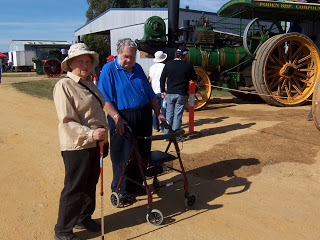 Dad and Mum looking at steam engines.
Dad and Mum looking at steam engines.Dad had introduced me to all those wonderful books that Mum liked. Even though Mum could read aloud very well and had even done it on the wireless, we preferred it when Dad read the stories because he put so much effort into doing the voices, and he would laugh as if he had only just got the joke, which might well have been the case. As we kids grew older, Dad introduced us to other books, the ones he liked. I remember one of the first 'adult' books I read was The Black Cloud by Fred Hoyle. It was a smashing science fiction story where the people of earth had to learn how to communicate with a giant approaching cloud that seemed to have less-than-benign intentions towards our small blue planet. It's one of the most disturbing stories ever written by a man called Fred. It started me on a lifelong appreciation of science fiction stories. A book about malevolent clouds can do that to a person. Then I got hold of The Day of the Triffids (not sure if this was Dad's book or from the school library) but that one was was a science fiction fan's dream: a smart, original plot, situations we could recognise or identify with, and a relentless energy that meant you really couldn't put the book down. I remember discussing with Dad about whether the earth might really be subjugated by human-eating plants one day. He certainly didn't discount the possibility. After all, we were about to put a man on the moon. I was, of course, a complete Apollo 11 nerd.
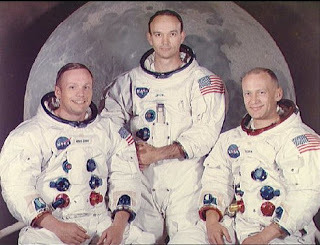 The crew of apollo 11. I have the same birthday as Michael Collins, the poor guy in the middle who flew all the way to the moon but never stood on it because he had to remain in parking orbit in the Columbia. For sone reason, I've always identified with him.
The crew of apollo 11. I have the same birthday as Michael Collins, the poor guy in the middle who flew all the way to the moon but never stood on it because he had to remain in parking orbit in the Columbia. For sone reason, I've always identified with him.I had a model of the Eagle on my bedhead. Dad even bought me special postage stamps from Yemen, which depicted Columbia the command module, and of course Eagle, the lunar module. These stamps were lenticular: a word I have only recently learned that describes a sort of hard-copy 3D. They were the coolest things I ever saw, and Dad knew that I would be just crazy about them. They've gone now, sold in a jumble sale during a lapse of judgment. I also had chemistry sets that were positively dangerous, so I was allowed to play with them only when Dad was around. Anyway, he was the one who ended up committing a scientific snafu when he lit some gunpower and blew off his eyebrows (as well as mine, as it happens. His grew back, mine never did).
When my sister and I returned to Geelong hospital the next day, Dad was out of the intensive care unit and in a ward with three other beds. His whiskers hadn't miraculously grown back overnight, but somehow he seemed to have returned to his correct size as he sat up in bed, looking much more like the Dad of old. Two days ago, someone had been opening him up and fiddling around with his heart. I hoped to god there were no stray hairs. Anyway, it was all pretty serious stuff, so perhaps I was asking too much of my father to appear more Dad-like when I'd seen him just the day before. He chatted and made jokes. He has always been able to make good jokes, just like his own father.
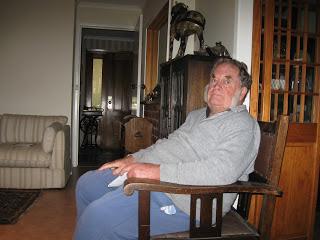
I have to accept it probably isn't likely that my father will survive another big operation like this - and he's already had a few. But Dmetri, with all due respect, I can't imagine the period of mourning being just a few short weeks.
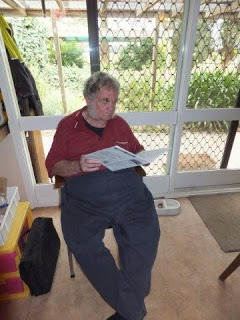
Published on September 24, 2012 02:19
September 10, 2012
Still Stroky
<!-- /* Font Definitions */ @font-face {font-family:"Times New Roman"; panose-1:0 2 2 6 3 5 4 5 2 3; mso-font-charset:0; mso-generic-font-family:auto; mso-font-pitch:variable; mso-font-signature:50331648 0 0 0 1 0;} /* Style Definitions */ p.MsoNormal, li.MsoNormal, div.MsoNormal {mso-style-parent:""; margin:0cm; margin-bottom:.0001pt; mso-pagination:widow-orphan; font-size:12.0pt; font-family:Courier; color:black; mso-ansi-language:EN-AU;} table.MsoNormalTable {mso-style-parent:""; font-size:10.0pt; font-family:"Times New Roman";} @page Section1 {size:595.0pt 842.0pt; margin:72.0pt 90.0pt 72.0pt 90.0pt; mso-header-margin:35.4pt; mso-footer-margin:35.4pt; mso-paper-source:0;} div.Section1 {page:Section1;} </style>--> <br /><div class="MsoNormal"><div class="separator" style="clear: both; text-align: center;"><a href="http://1.bp.blogspot.com/-YKmdMfRA86c..." imageanchor="1" style="margin-left: 1em; margin-right: 1em;"><img border="0" height="320" src="http://1.bp.blogspot.com/-YKmdMfRA86c..." width="258" /></a></div>Sorry, it's been a while since the last post. But i still love you. It's not you. It's me.<br /><br /></div><div class="MsoNormal"><br /></div><div class="MsoNormal">We had the madness of The Melbourne Writers Festival, which I loved this year, if only because it was the first time ever that I was actually on stage and a part of it. I was interviewed about <i>The Shiny Guys</i><span style="font-style: normal;"> by Nicole Armstrong, who was kind enough to send me the questions in advance, though I still found them difficult to answer, and it required me to take a second look at the book and ask myself why I wrote it. This is not the sort of soul-searching I normally do, so it was good to get a heads-up from Nicole, who later told me it was her first time as a MWF interviewer, though it didn't show.</span></div><div class="MsoNormal"><br /></div><div class="MsoNormal">The panel session with Scot Gardner, where we talked about why our humour is so dark, was a lark. I feel an affinity with Scot because we both went to the same shithouse schools in The Latrobe Valley (Grey Street Primary and Maryvale High), though we were ten years apart. This shared experience seems to have turned Scot into an affable family man and very strong writer, while I don't think I have managed to gain quite as much benefit.</div><div class="MsoNormal"><br /></div><div class="MsoNormal">Then we had <i>Write Along the Murray</i><span style="font-style: normal;"> in Albury, which I agreed to do this year because I dropped out last year at the last minute when I had the stroke. It's horrible to think that I'm still getting over it, and can't make myself heard with a group of teenagers unless I have a microphone. Even then I sound stroky, talking through my nose a lot. The Albury crowd was good, and the highlight for me was doing a stage interview with Fiona O'Loughlin as special guest. She was her usual disarming and fabulously funny self. Years ago, Fiona and I worked on a TV pilot that was based on her life. </span><br /><br /><div class="separator" style="clear: both; text-align: center;"><a href="http://2.bp.blogspot.com/-GIxNoiv4V5k..." imageanchor="1" style="margin-left: 1em; margin-right: 1em;"><img border="0" src="http://2.bp.blogspot.com/-GIxNoiv4V5k..." /></a></div><br /><span style="font-style: normal;"> It turned out pretty well and we wrote two more scripts that everyone seemed to like, but the show went nowhere. Network Seven didn't think that the expense of shooting a series in Darwin was worth it. They were probably right, but it was difficult to move the show to another location, since the whole series was based on Fiona's stand-up. (We used Darwin as a stand-in for Alice Springs.) IT was great to work with Fiona on the show, then end up with something I was pretty happy with, so of course it hurt when we were knocked back. Speaking of 'hurt' I got back home from Albury and foolishly dedided to go online and check out the reviews for the Kath and Kim movie, which I script-edited. The reviews were nearly all smartarse and bad, though apparently the show is a commercial success. Jane and Gina worked so hard on that film, I hope they get their just deserts, and the critics can all go screw themselves.</span></div><div class="MsoNormal">Because I've spent the whole year trying to get over the stroke, I haven't planned much for next year. The priority project at the moment is The Margaret Fulton Musical, mentioned elsewhere on this blog, I've been lucky to work with such young, motivated people, including director Bryce Ives. Our singers are all excellent, especially laura Burzacott who seems to get better and better every time I see her.</div><div class="MsoNormal"><br /></div><div class="MsoNormal">I was reminded of the stroke (like I needed to be reminded) when I went to the Blood Bank yesterday to give blood. After drinking all the free milkshakes and wolfing down the free fruitcake I was eventually seen by a nurse who told me they were unable to take my blood because stroke survivors are vetoed. I kept telling the nurse that I felt fine, and even stood on one leg to prove it, but the answer was still no.</div><div class="separator" style="clear: both; text-align: center;"><a href="http://3.bp.blogspot.com/-xK10yV-d_j4..." imageanchor="1" style="margin-left: 1em; margin-right: 1em;"><img border="0" height="320" src="http://3.bp.blogspot.com/-xK10yV-d_j4..." width="291" /></a></div><div class="separator" style="clear: both; text-align: center;"><a href="http://4.bp.blogspot.com/-q_Sx0dZrdOs..." imageanchor="1" style="margin-left: 1em; margin-right: 1em;"><img border="0" height="275" src="http://4.bp.blogspot.com/-q_Sx0dZrdOs..." width="320" /></a></div><div class="separator" style="clear: both; text-align: center;"><a href="http://2.bp.blogspot.com/-mWucKF-Bz1k..." imageanchor="1" style="margin-left: 1em; margin-right: 1em;"><img border="0" height="297" src="http://2.bp.blogspot.com/-mWucKF-Bz1k..." width="320" /></a></div><div class="MsoNormal"><br /></div><div class="MsoNormal"><br /></div><div class="MsoNormal">Since I last posted, the picture book <i>Heather Fell in the Water</i><span style="font-style: normal;"> has been published by the good people at Allen and Unwin. We had a launch in Bendigo, which my whole family even Dad, who's about to have a second heart bypass operation) was good enough to attend. Given that the book is basically a steal from my little sister's life, it was nice to get the family on side. I may well use them again! Craig Smith's illustrations are quite beautiful, not that this comes as any surprise to me. He remains my favourite picture book illustrator, and we have another one, </span><i>The Windy Farm</i><span style="font-style: normal;">, coming out next year from Working Title. It's a non-too-serious picture book about sustainability, complete with flying pigs, wonderfully realised by Craig.</span></div><div class="MsoNormal"><br /></div><br /><div class="separator" style="clear: both; text-align: center;"><br /></div><br /><div class="separator" style="clear: both; text-align: center;"><a href="http://2.bp.blogspot.com/-msyjIu100X4..." imageanchor="1" style="margin-left: 1em; margin-right: 1em;"><img border="0" height="316" src="http://2.bp.blogspot.com/-msyjIu100X4..." width="320" /></a></div><div class="MsoNormal"><br /></div><div class="MsoNormal"><br /></div><div class="MsoNormal"><br /></div><div class="MsoNormal">My sequel to <i>The Life of a Teenage Body-snatcher</i><span style="font-style: normal;"> (</span><i>The Teamen) </i><span style="font-style: normal;">has been with Penguin for a few months now, but I haven't heard from them. I personally don't think the second book is as strong as the first book, as it veers dangerously into the fantasy genre, complete with zombies, but of course I'd be happy to rework it with an editor if I knew it was being published.</span></div><div class="MsoNormal"><br /></div><div class="MsoNormal">Thanks for sticking by me, blog readers, sorry the news isn't more sensational. I've stopped being objectionable on Facebook, which I think is a sure sign that I really am recovering from the stroke. For those keen on <a href="http://www.theatreworks.org.au/whatso... Margaret Fulton musical</a>, here's a pic of a rehearsed reading - and singing - held at The Wrong Crowd bar in Geelong. That's Margaret Fulton doing a duet with (I think) Paul Hamlyn.</div><div class="separator" style="clear: both; text-align: center;"><a href="http://4.bp.blogspot.com/-fICugs0QNMg..." imageanchor="1" style="margin-left: 1em; margin-right: 1em;"><img border="0" height="189" src="http://4.bp.blogspot.com/-fICugs0QNMg..." width="320" /></a></div><div class="MsoNormal"><br /></div><div class="MsoNormal"><br /></div><div class="MsoNormal"><br /></div><div class="MsoNormal"><br /></div><div class="blogger-post-footer"><img width='1' height='1' src='https://blogger.googleusercontent.com...' alt='' /></div>
Published on September 10, 2012 18:21
July 28, 2012
Work in Progress
When I first met the Australian cookery superstar, Margaret Fulton, it didn't occur to me that I would one day write a musical about her. My job at the time was to propose to Margaret the idea of doing a TV special about her. This was long before all the Masterchef and celebrity cook TV shows existed. I was working in TV for Steve Vizard, and we wanted to produce a series of shows about 'Australian icons'. As I spoke with Margaret it became obvious that one show might not be enough. As we sat in her Balmain house, enjoying views of Sydney Harbour and eating Anzac biscuits, Margaret told me story after story about the mini-adventures that were all part of her life. Margaret was bright, funny and sharp. She spoke clearly and proudly about a remarkable career that covered five decades. (Some of these were later compiled with her favourite recipes in a biography called I Sang for my Supper.) I'm not sure Margaret actually wanted to be part of our proposed TV series. I quickly bought the rights to the biography because, even though Margaret wasn't so keen on the TV idea, I suspected that I would one day dramatise the story, though the idea of making a musical about Margaret's life didn't occur till years later.
When I was no longer working full-time for Steve Vizard, I pitched the idea of a Margaret Fulton musical to Simon Phillips, who was then the artistic director of The Melbourne Theatre Company. Simon liked the idea and gave me a little bit of money to present a 'treatment'. I contacted TV colleague and composer Yuri Worontschak to help me with the songs. We recorded five in all, to give Simon a taste of what we wanted to do. (By this time, the successful musical Keating was up and running, and doing very well. I've also blogged about that.) It was a slow process. When I eventually had the presentation ready for Simon, he had made a decision to move on from the MTC, so the whole project was 'put on the back-burner'. I was over thirty, so quite used to projects going nowhere. I tucked the songs and the first act away on my hard drive, and didn't give it much thought until I met young produce/director Bryce Ives. We were lucky enough to work together on Tracy Harvey's musical comedy set in a call centre: 'Call Girl'. (I mention this elsewhere on my blog.) It was a show that made no money and disappeared but left everyone feeling energised and optimistic for some reason. It probably helped that most of the cast and crew were young. And the show was good.
Bryce Ives was under thirty, so he was a lot less jaded about the business than I was. I passingly mentioned the idea of the Margaret Fulton musical and he was instantly enthusiastic. He kept coming up with ingenious ideas about how such a musical could be staged. He just wanted me to finish the script and let him sort out the other stuff. I contacted Margaret, who gave her blessing to the script and songs thus far, and seemed equally keen for me to finish the project. Margaret was always supportive. She sent me a card from Scotland when she went to visit family over there. The card contained a sprig of Scottish heather for luck.
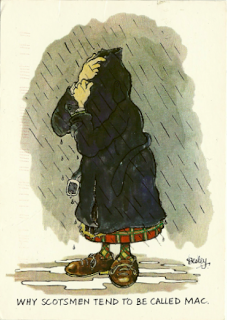 A greeting card from Margaret. Unfortunately, the heather never arrived because it's extremely illegal to send plant matter through Australia Post. When the card finally turned up on my doorstep, it was wrapped in adhesive tape informing me that it had been inspected by the customs department, the heather had been removed, but the card was still okay, if a little bent and battered. So I returned to writing the show, since Margaret had allowed me to take such liberties with her life. Using the biography, and my regular recorded interviews with Margaret, along with a heap of transcripts I found on-line, I wrote the rest of the songs and compiled a second act. People's lives rarely obey the laws of drama. When Alfred Hitchcock said that drama was real life with the boring bits cut out, he really knew what he ewas talking about. But there seemed few boring bits in Margaret's life; there was no deadly struggle facing heartless villains and an eventual triumph. Margaret seemed successful from day one. It was, I suspect, due to her optimistic personality. She did, however have one or two secrets to tell, and with her permission I included these in the script, which she has now approved. Bryce Ives organised a place for our production in the Theatreworks 2012 schedule. (Theatreworks is a small theatre based in St Kilda, and originally set up by students from The Victiorian College of Arts, my old school.)Then Bryce, who remained hugely enthusiastic about the project, went about getting some funding together.
A greeting card from Margaret. Unfortunately, the heather never arrived because it's extremely illegal to send plant matter through Australia Post. When the card finally turned up on my doorstep, it was wrapped in adhesive tape informing me that it had been inspected by the customs department, the heather had been removed, but the card was still okay, if a little bent and battered. So I returned to writing the show, since Margaret had allowed me to take such liberties with her life. Using the biography, and my regular recorded interviews with Margaret, along with a heap of transcripts I found on-line, I wrote the rest of the songs and compiled a second act. People's lives rarely obey the laws of drama. When Alfred Hitchcock said that drama was real life with the boring bits cut out, he really knew what he ewas talking about. But there seemed few boring bits in Margaret's life; there was no deadly struggle facing heartless villains and an eventual triumph. Margaret seemed successful from day one. It was, I suspect, due to her optimistic personality. She did, however have one or two secrets to tell, and with her permission I included these in the script, which she has now approved. Bryce Ives organised a place for our production in the Theatreworks 2012 schedule. (Theatreworks is a small theatre based in St Kilda, and originally set up by students from The Victiorian College of Arts, my old school.)Then Bryce, who remained hugely enthusiastic about the project, went about getting some funding together. An early read-through of the production. Sean Bryan, our production manager, is the one sitting cross-legged with the notebook on his lap. I'm the guy in the middle background on the right, being my usual ebullient self
An early read-through of the production. Sean Bryan, our production manager, is the one sitting cross-legged with the notebook on his lap. I'm the guy in the middle background on the right, being my usual ebullient selfBryce also had a network of very gifted theatre mates who came on board to help with the project. Nate Gilkes joined us as musical director, and Andrew Bellchambers signed on as designer. When you work with someone like Bryce you can't help but be swept up in his enthusuiasm. I'm over fifty, and going out to see live shows at night is usually a pain for me. I'm always worried that I'll be bored. AFter having the stroke, I tend to nod off. Bryce's crowd were out at shows most nights. They never got bored. I liked hearing their opinions of the various shows they saw. They rarely trashed anything. They always seemed to find positive things about the shows. It was a whole new approach for me. Then I realised that it wasn't new at all. I had been the same in my twenties. When I was the dramaturg-in-residence at Playbox, I was out most nights and was probably La Mama's most reguklar customer. La Mama, in Faraday Street, Carlton, like many of the other theatrical venues in Melbourne at the time, had not been built as a theatre. It was a small warehouse that had been converted into a performance space after some determined fund-raising. I still go there, but my over-fifties side kicks in. I always sit up the back because of my fear of boredom. And at La Mama, the actors can see you, the audience is so close. I went to a very good one-woman show by Rachel Berger. Someone in the front row was playing with a lolly wrapper and the noise was irritating Rachel. Rather than heckle the audience member, which actors are sometimes forced to do, Rachel went quietly up to the lolly-wrapper fiend in the front row and quietly took away his wrapper. Theatres like The Pram Factory were the same. These were not big spaces, the stage rarely had wings and the auditoria were generally small. Audiences were just as exposed as performers. Then there was The Flying Trapeze on Brunswick Street. Absolutely Tiny. This was a shopfront (I think it had once been a fish and chip shop) with an audience area so small that people walking down Brunswick Street could stop outside the shop window and watch the show. Whenever comedy duo Los Trios Ringbarkus performed a late show, the demand for tickets was high, and I remember joining the groups of people standing outside the shop window late at night and and looking in for free. Owner Ralph Kerle could probably have charged us, and I'm surprised he didn't. I was never 'worried' about being bored, because I so rarely was. It helped me get a writer-in-residence gig at The Playbox Theatre Company. When I left Playbox after a year and went to work in TV, I stopped all that theatre-going. I got old and tired. In my thirties, I rarely went to live theatre. I'd be more likely to go to a comedy club, or The Melbourne International Comedy Festival, to see if there were any new local talents that I could plunder for TV.
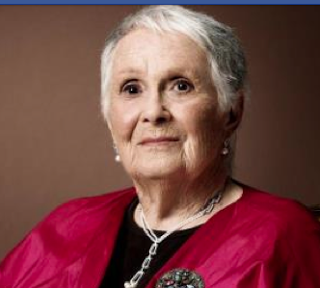 The icon herself.
The icon herself.In short, The Margaret Fulton Musical project exists because some talented young people were enthusiastic and thought they should put it on. The theatre where the show will be staged later this year was not originally built as a theatre. It's the old Parish Hall on Acland Street in St Kilda, but right now Bryce and the gang including (young and energetic) designer Michael Bellchambers are working out how to make this space work for us. Fortunately, Margaret Fulton herself has a lot of fans and there has been much interest in the production, which will happen in November. I’m still in stroke recovery, so writing is hard for me, but the team remains so positive and devoted to the project that I'm trying extra-hard to make it good. We've had few run-throughs of the songs, and they've been great. The song about when the first Margaret Fulton cookbook was published really rocks, thanks mainly to Nate's ingenious arrangement. I think that when you get older, it's vital to work with young people, who teach you enthusiasm. It's going to be a great show, folks.
Published on July 28, 2012 19:46
July 9, 2012
You have to be kind, dammit!
's why.
Here is something I didn't say. It's from an articlre in the Melbourne The title for today's post comes from Kurt Vonnegut, as a sort of survival guide to life.
Here below is something I didn't say. It's from an article in the Melbourne Herald-Sun concerning the Margaret Fulton musical that some friends and I are staging at Theatreworks in St Kilda later this year. I never made the comment that Simon Plant attributes to me. I haven't spoken to any journalist about the show. It's probably on a press release that someone put out with the best of intentions. It's just annoying to have this bit of stuff on the web, and to have people infer I said something when I patently didn't. It's also a little worrisome because, while Margaret has always been open about her peripheral invovement with the fledgling communist party in Australia, before it all went horribly wrong in Russia, she didn't want me to make a big deal about it in the script. I complied, but the article makes it look like I'm going back on my word. It also makes me into a gushing threatre lovie by having me apparently spew endless superlatives about the quality of the show, and people who know me also know that I don't tend to talk like that. The show's good. Come and see it. There it is.Here is something I didn't say. It's from an article in the Melbourne erald Sun, about the musical about mArgaret Fulton that Theatreworks are staging later this year.But I never made the comment that Simon Plant the journalist attributes to me. It' s a little worrisome, because while Margaret has always been open about her involvement with the fledgling communist party in Australia, before it all went horribly wrong in Russia, Margaret has requested that I don't make it a principle feature of the show. I've rewritten some of the script accordingly, because I wanted Margaret to be happy with result. I think she is happy. But I
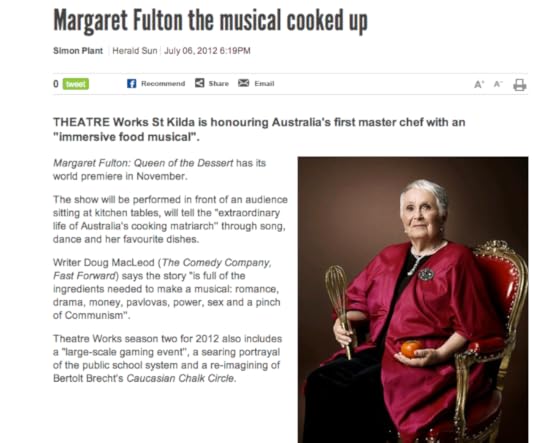
's why.
When you work in TV, some people get the wrong impression that your life must be interesting, even if you are just behind the scenes, as I am. In 1988 and 1989 I was stupendously lucky to be part of a group that formed an Australian TV show called The Comedy Company. I was the head writer, though many of the performers wrote their own material. As head writer of a popular show (covered elsewhere on this blog) I was often approached by journalists asking for my opinion on matters comic. And because I was hungry for recognition (I'd practically starved before getting the Comedy Company gig, working for theatre restaurants and theatre companies for very little money) I was quite prepared to put in my two cents' worth. This was a bad thing. My views were often ill-advised or just plain wrong. Perhaps it isn't surprising, therefore that some of the country's leading comedy practitioners, such as Red Symons took the occasional dig at me.
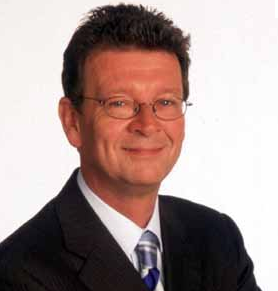
Ah yes, The Red Symons thing. It all happened after I asked Red to help me out with the charity, Comic Relief. I was working at the time for Paul Jackson, one of the leading TV producers in England. (Think 'The Young Ones') Paul had been involved in the famous Comic Relief charity over there. In fact, I believe he was the one who shot the 1993 footage of Billy Connolly running naked around Trafalgar Square. Paul was so keen to get the charity up and running in Australia, comedians seemed to think this was a good idea, and I wanted to be a part of it, but I didn't want to produce another bloody big sketch show because they're a huge headache. Channel Nine had given us an unofficial commitment that they would devote a night of their programming to Comic Relief. They were very impressed by the tape that we sent them, full of clips of famous English comedians larking about, trying to convince viewers to give money for Comic Relief, money that would be passed straight onto charity. At the time I was producing a 'Bob Downe' show for TV1.
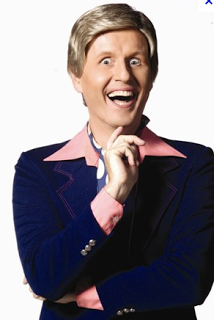
Mark Trevorrow (Bob Downe) and I would write the scripts together each week. One of the sillier jokes was that Bob Downe had his own line of greeting cards for very special occasions, that he would read to viewers. Here are two examples:
We're sorry you're in hospitalAnd think of you each hour.We hope they can remove that thingYou fell on in the shower
Or …
Have a happy Mardi GrasAlthough you say you're straightThere's seven boys who say you aren't,Can I be number eight?
Not Wildean, but it got its laugh. Because we were forever searching for material to fill the half hour, I wrote quite a lot of these verses (see more scans from the book below), which Bob Downe delivered extremely well. It occurred to me that a book of verses like this might be a good Comic Relief idea, and I wouldn't have to produce a TV show at all. I ran the idea by Paul Jackson, then my publisher (Penguin). Paul was enthused, I started writing a lot of extra material and trying it out on kids. The response was positive. One of the conditions of Penguin taking the book was that it would tie in with the proposed TV presentation. Paul Jackson told me he would even get Billy Connolly to write a foreword. All very exciting, especially when illustrator Craig Smith came aboard. Paul Jackson handed over the executive producer role to a couple of guys I have never heard of. They ran a promotions company called Roar and were equally enthusiastic about the project and did the broadcasting negotiations with Channel Nine. I wasn't a part of these negiotiations, so I don't know went wrong. But someone caused offence and Nine decided to back out. The book was no longer such a desirable commodity but Penguin still boldly agreed to go ahead with it, even though there would be no TV broadcast to help promote the book. There would also, it seemed, be no Billy Connolly who was uncontactable, as he was filming somewhere in frozen Eastern Europe. So I asked Paul Jackson if he could chase up the Ben Elton option. That also fell over, because Ben didn't get the message, or was having a sex change or something. So I plumped for an Australian comic personality to write the foreword.
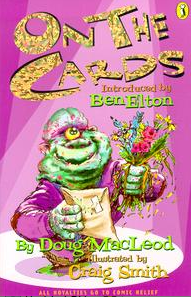
Red Symons was the first famous person I ever met. I was sixteen, and a big Skyhooks fan. My first book had just been published - and Skyhooks and I had the same publicity agent, a company called Propaganda. Red was sitting in the foyer of their office on Lonsdale Street when I met him. We started talking, he asked me what royalty I was getting for the book. I told him ten percent and he told me I was being ripped off, it wasn't enough. Then he asked to have a look at the book and I handed it over. He flipped through it. 'I was wrong,' he said, 'Ten percent is enough. You aren't being ripped off.' It was a very funny thing to say, and I probably laughed, even though I was still gobsmacked to be on the same settee as one of my heroes.Twenty years later, I thought that Red, also a Penguin author, would be perfect to write an excellent, silly foreword for the book of unlikely greeting card rhymes that we came to know as On The Cards.So I sent Red the On The Cards manuscript with beautiful sketches from Craig Smith, and he said he would be happy to write a foreword and that he would make it part of his weekly column in The Melbourne Age newspaper and that it would be funny. Penguin seemed happy because Red had good credentials. I was happy and I waited for the column to appear, so we could sign off on the book. The column did appear, but it was a damning piece which more or less accused me of being a show pony and doing the book merely to energise my backlist. (I didn't even have a backlist at the time.) It was a terrible piece, that misquoted me and basically attributed the work I'd done with Craig Smith and Penguin's editorial staff to the most cynical of motives. Using a charity for nefarious purposes. How dare we! (It might have been funny if Red were actually saying the words aloud, in the way he dissed my first book. In black and white print it was pure vitriol.)
I rang Alice Ghent at The Age to voice my upset. Alice was Red's editor, and she was clearly horrified to learn that Doug MacLeod was a real person. She had assumed that I was someone invented by Red as a sort of punching bag on which to inflict his own brand of insult comedy. (Red lists one of his favourite comedians as Don Rickles, who specialises in insult comedy, which I've never been crazy about.) When I asked if Red could write a retraction, Alice told me that she couldn't possibly ask Red to do that. (I think she might have actually been scared of him) but I was given the option of writing a letter of rebuttal or clarification that would be placed on The Age letters page, three days after the offending article had appeared. I did something incredibly stupid. I wrote the letter while still angry and sent it to Alice before I had calmed down. (It didn't help that my dad was ill at the time, so I was naturally stressed about that.)Now, the Letters page is/was the most-read part of The Age. And so, my cynical rebuttal to Red was placed among letters on far loftier subjects. Most people reading the letters page would have had no idea of what my letter referred to and it all came across as very nasty, even cruel. My 'Age' letter to Red is still on line somewhere. But I'm not including a link because I can't bear to read the letter again. Perhaps there was an element of truth in what Red had written. Perhaps getting the book together really was an ego-trip on my part. I'm not sure, but even though the book is a beautiful little thing with a laser-foil cover, I can't bring myself to read it out loud to kids in schools, because the memory of Red's insult column is so painful. I haven't spoken with him since.
The moral of this post is to take a deep breath and relax when someone flames you like that. I'm certainly not going to complain to Simon Plant about the Margaret Fulton gaffe. Simon's a nice guy, and I remember him from yesteryear when I was being consulted by journalists on any comedy issues of the day. He even came to a 'comedy-writing workshop' that I unwisely agreed to do for the Australian Writers Guild. I still haven't been paid for that, but it was back in 1989 so I don't think I'll chase it up. Peace, love and happiness, everyone, and be careful about what you put on the Internet. You have to be kind, dammit!(Here, as promised, are some scans from On The Cards. Apologies for the poor quality.)

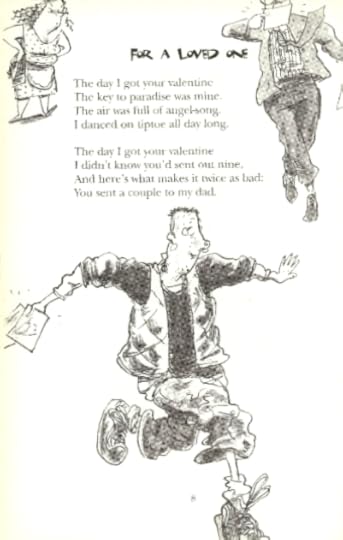
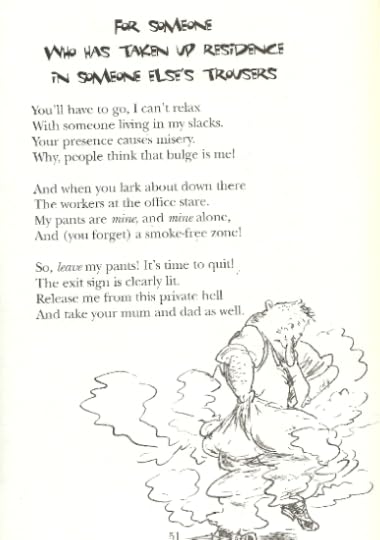
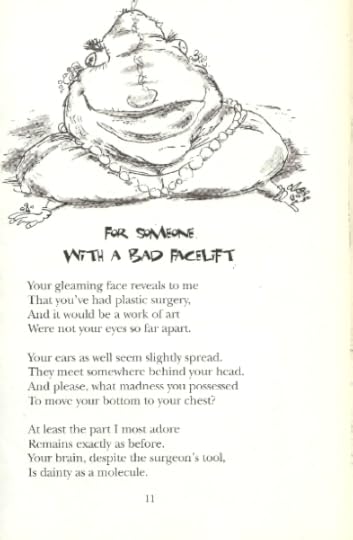
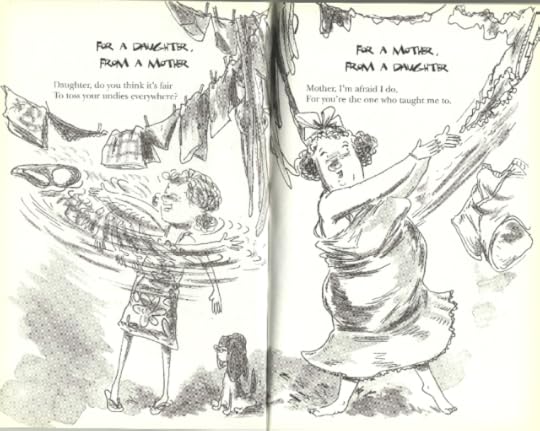

Here is something I didn't say. It's from an articlre in the Melbourne The title for today's post comes from Kurt Vonnegut, as a sort of survival guide to life.
Here below is something I didn't say. It's from an article in the Melbourne Herald-Sun concerning the Margaret Fulton musical that some friends and I are staging at Theatreworks in St Kilda later this year. I never made the comment that Simon Plant attributes to me. I haven't spoken to any journalist about the show. It's probably on a press release that someone put out with the best of intentions. It's just annoying to have this bit of stuff on the web, and to have people infer I said something when I patently didn't. It's also a little worrisome because, while Margaret has always been open about her peripheral invovement with the fledgling communist party in Australia, before it all went horribly wrong in Russia, she didn't want me to make a big deal about it in the script. I complied, but the article makes it look like I'm going back on my word. It also makes me into a gushing threatre lovie by having me apparently spew endless superlatives about the quality of the show, and people who know me also know that I don't tend to talk like that. The show's good. Come and see it. There it is.Here is something I didn't say. It's from an article in the Melbourne erald Sun, about the musical about mArgaret Fulton that Theatreworks are staging later this year.But I never made the comment that Simon Plant the journalist attributes to me. It' s a little worrisome, because while Margaret has always been open about her involvement with the fledgling communist party in Australia, before it all went horribly wrong in Russia, Margaret has requested that I don't make it a principle feature of the show. I've rewritten some of the script accordingly, because I wanted Margaret to be happy with result. I think she is happy. But I

's why.
When you work in TV, some people get the wrong impression that your life must be interesting, even if you are just behind the scenes, as I am. In 1988 and 1989 I was stupendously lucky to be part of a group that formed an Australian TV show called The Comedy Company. I was the head writer, though many of the performers wrote their own material. As head writer of a popular show (covered elsewhere on this blog) I was often approached by journalists asking for my opinion on matters comic. And because I was hungry for recognition (I'd practically starved before getting the Comedy Company gig, working for theatre restaurants and theatre companies for very little money) I was quite prepared to put in my two cents' worth. This was a bad thing. My views were often ill-advised or just plain wrong. Perhaps it isn't surprising, therefore that some of the country's leading comedy practitioners, such as Red Symons took the occasional dig at me.

Ah yes, The Red Symons thing. It all happened after I asked Red to help me out with the charity, Comic Relief. I was working at the time for Paul Jackson, one of the leading TV producers in England. (Think 'The Young Ones') Paul had been involved in the famous Comic Relief charity over there. In fact, I believe he was the one who shot the 1993 footage of Billy Connolly running naked around Trafalgar Square. Paul was so keen to get the charity up and running in Australia, comedians seemed to think this was a good idea, and I wanted to be a part of it, but I didn't want to produce another bloody big sketch show because they're a huge headache. Channel Nine had given us an unofficial commitment that they would devote a night of their programming to Comic Relief. They were very impressed by the tape that we sent them, full of clips of famous English comedians larking about, trying to convince viewers to give money for Comic Relief, money that would be passed straight onto charity. At the time I was producing a 'Bob Downe' show for TV1.

Mark Trevorrow (Bob Downe) and I would write the scripts together each week. One of the sillier jokes was that Bob Downe had his own line of greeting cards for very special occasions, that he would read to viewers. Here are two examples:
We're sorry you're in hospitalAnd think of you each hour.We hope they can remove that thingYou fell on in the shower
Or …
Have a happy Mardi GrasAlthough you say you're straightThere's seven boys who say you aren't,Can I be number eight?
Not Wildean, but it got its laugh. Because we were forever searching for material to fill the half hour, I wrote quite a lot of these verses (see more scans from the book below), which Bob Downe delivered extremely well. It occurred to me that a book of verses like this might be a good Comic Relief idea, and I wouldn't have to produce a TV show at all. I ran the idea by Paul Jackson, then my publisher (Penguin). Paul was enthused, I started writing a lot of extra material and trying it out on kids. The response was positive. One of the conditions of Penguin taking the book was that it would tie in with the proposed TV presentation. Paul Jackson told me he would even get Billy Connolly to write a foreword. All very exciting, especially when illustrator Craig Smith came aboard. Paul Jackson handed over the executive producer role to a couple of guys I have never heard of. They ran a promotions company called Roar and were equally enthusiastic about the project and did the broadcasting negotiations with Channel Nine. I wasn't a part of these negiotiations, so I don't know went wrong. But someone caused offence and Nine decided to back out. The book was no longer such a desirable commodity but Penguin still boldly agreed to go ahead with it, even though there would be no TV broadcast to help promote the book. There would also, it seemed, be no Billy Connolly who was uncontactable, as he was filming somewhere in frozen Eastern Europe. So I asked Paul Jackson if he could chase up the Ben Elton option. That also fell over, because Ben didn't get the message, or was having a sex change or something. So I plumped for an Australian comic personality to write the foreword.

Red Symons was the first famous person I ever met. I was sixteen, and a big Skyhooks fan. My first book had just been published - and Skyhooks and I had the same publicity agent, a company called Propaganda. Red was sitting in the foyer of their office on Lonsdale Street when I met him. We started talking, he asked me what royalty I was getting for the book. I told him ten percent and he told me I was being ripped off, it wasn't enough. Then he asked to have a look at the book and I handed it over. He flipped through it. 'I was wrong,' he said, 'Ten percent is enough. You aren't being ripped off.' It was a very funny thing to say, and I probably laughed, even though I was still gobsmacked to be on the same settee as one of my heroes.Twenty years later, I thought that Red, also a Penguin author, would be perfect to write an excellent, silly foreword for the book of unlikely greeting card rhymes that we came to know as On The Cards.So I sent Red the On The Cards manuscript with beautiful sketches from Craig Smith, and he said he would be happy to write a foreword and that he would make it part of his weekly column in The Melbourne Age newspaper and that it would be funny. Penguin seemed happy because Red had good credentials. I was happy and I waited for the column to appear, so we could sign off on the book. The column did appear, but it was a damning piece which more or less accused me of being a show pony and doing the book merely to energise my backlist. (I didn't even have a backlist at the time.) It was a terrible piece, that misquoted me and basically attributed the work I'd done with Craig Smith and Penguin's editorial staff to the most cynical of motives. Using a charity for nefarious purposes. How dare we! (It might have been funny if Red were actually saying the words aloud, in the way he dissed my first book. In black and white print it was pure vitriol.)
I rang Alice Ghent at The Age to voice my upset. Alice was Red's editor, and she was clearly horrified to learn that Doug MacLeod was a real person. She had assumed that I was someone invented by Red as a sort of punching bag on which to inflict his own brand of insult comedy. (Red lists one of his favourite comedians as Don Rickles, who specialises in insult comedy, which I've never been crazy about.) When I asked if Red could write a retraction, Alice told me that she couldn't possibly ask Red to do that. (I think she might have actually been scared of him) but I was given the option of writing a letter of rebuttal or clarification that would be placed on The Age letters page, three days after the offending article had appeared. I did something incredibly stupid. I wrote the letter while still angry and sent it to Alice before I had calmed down. (It didn't help that my dad was ill at the time, so I was naturally stressed about that.)Now, the Letters page is/was the most-read part of The Age. And so, my cynical rebuttal to Red was placed among letters on far loftier subjects. Most people reading the letters page would have had no idea of what my letter referred to and it all came across as very nasty, even cruel. My 'Age' letter to Red is still on line somewhere. But I'm not including a link because I can't bear to read the letter again. Perhaps there was an element of truth in what Red had written. Perhaps getting the book together really was an ego-trip on my part. I'm not sure, but even though the book is a beautiful little thing with a laser-foil cover, I can't bring myself to read it out loud to kids in schools, because the memory of Red's insult column is so painful. I haven't spoken with him since.
The moral of this post is to take a deep breath and relax when someone flames you like that. I'm certainly not going to complain to Simon Plant about the Margaret Fulton gaffe. Simon's a nice guy, and I remember him from yesteryear when I was being consulted by journalists on any comedy issues of the day. He even came to a 'comedy-writing workshop' that I unwisely agreed to do for the Australian Writers Guild. I still haven't been paid for that, but it was back in 1989 so I don't think I'll chase it up. Peace, love and happiness, everyone, and be careful about what you put on the Internet. You have to be kind, dammit!(Here, as promised, are some scans from On The Cards. Apologies for the poor quality.)





Published on July 09, 2012 22:03
June 20, 2012
Andy Griffiths made me miss my plane.
I've spent far too long on Google trying to find out who first said 'There are but three things that writers desire: praise, praise and praise. So I’m going to take a stab in the dark and say it was Dorothy Parker. I'm sure I read it in What Fresh Hell is This?(Best book title ever.)
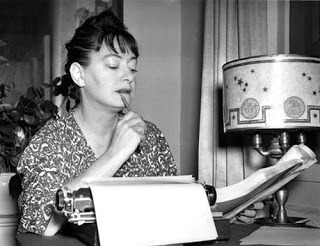
It's frighteningly true, whoever said it. Writers, I have been known to opine, are the most tedious of facebook friends. Have you been included on The Vic Premier's Reading Challenge list? (Which contains close to a thousand titles anyway, and yeah, I'm there.) For god's sake put it on facebook because people really need to know just as soon as possible. And even if you are only a passing acquaintance with the aforementioned tragic writer for god's sake leave a comment or give them a 'like', or you'll be unfriended - and we know how painful that is.
Time for me to come clean. Presuming it was Dorothy Parker who said that thing about praise, I am definitely a friend of Dorothy. I can't help it. I sit in this bloody room for about eight hours a day and make up rubbish that I hope people will find mildly diverting. My original aim when I left my full-time job in TV was to have one novel per year published. Penguin thinks that is far too many. And they do have a certain standard to maintain. After all, they published a kids' book called There's Money in Toilets, so we are looking at a publisher of some taste and distinction. (The toilet book is by a colleague, Robert Greenberg who is easily offended, and as self-involved as all writers, so I should add as a sop that it's actually quite a good story based on an interesting premise, it's just got a title that tries far too hard to capture the farting arse market that Andy Griffiths has so lovingly made his very own.
Now, if I'm going to apologise to Robert, I should also apologise to Andy. I actually sat on a CBCA panel once and defended The Day My Bum Went Psycho, on the grounds that it was a satire on James Bond. Really, the idea that there is a deranged giant bum somewhere that wishes to release some sort of force that means every human on earth will lose their heads and end up with extra bums on their shoulders is worthy of the Bondian evil mastermind, Ernst Stavro Blofeld. Sure, it's stupid, but so is the idea of stealing three nuclear warheads and holding the world to ransom. Why, Blofeld ? What the hell do you want? This is what Blofeld did in the Bond movie Thunderball where we first saw his lovely white long-haired cat that he kept on his knee. I always thought that was funny; that Blofeld, who only ever wears black, should have a white Persian pussycat. We used to have such a pet in this household. Not only do they tend to be stroppy and deaf, especially if their eyes are of different colours, but they shed so much white fur that, without constant hoovering, you end up with a flokati rug in the living room that you never knew you had. As for your groovy tight-leg black pants, they end up covered in a flock of white fur. So really, in that scene where we first meet Blofeld, we should see a man entirely covered in bits of white fur, trying with dignity to outline his plan for world domination while his shaggy pet cat keeps biting at his legs or digging his claws in, which is a bad look for an evil mastermind.

That scene in Spectre when we first meet Blofeld (although we only ever see his legs, for the rest of him is concealed by frosted glass and the fluffy white cat, should really be more like this:Several numbered but unnamed spectre agents sit around a table as Blofeld, only half seen by us, conducts a board meeting. (Sorry for the dodgy layout. How wise of the Blogger people to change everything about their program, given that we've only just learned how to use it.) Blofeld I regret to inform you all of the death of SPECTRE Number Six. Colonel Jacques Bouvar was killed by an unknown assassin. His services will be greatly missed. We will now hear the area financial reports. Number Seven? Blackmail of the double agent Matsou Fujiwa? Bad GuyUnfortunately, only a million yen. Blofeld That's all? Bad guy All the man had.Blofeld Number Ten? Assassination of Perringe, the anti-matter specialist who went over to the Russians?White Fluffy Cat Miaow.BlofeldOw, get your claws out of my goolies, you fluffy white monster. I am world-class evil mastermind Ernst Blofeld and I will not be clawed in the goolies.Bad GuySir, we got three million francs from the Quai d'Orsay. Another Bad Guy Our consultation fee for the British train robbery: was -Fluffy white CatMiaow. Miaow. Miaow.BlofeldOw. Shut up, you idiot.Another Bad guy Sorry, Number One, I thought you would want to know.Blofeld. I was talking to the cat, not you, you idiot.Bad guyDistribution of Red China narcotics in the United States, collected by Number Nine and myself, comes to 2,300.000 dollars Blofeld. Two million three? Our expectations were considerably higher, Number Eleven.Fluffy White CatMiaooooow Hisss!Blofeld You have upset my cat. Kindly explain.Bad GuyWell, sir, fluffy white cats are notoriously cantankerous.BlofeldI was talking about the two million three hundred thousand dollars, inbecile. Why the shortfall?Bad guy Competition from Latin America. Prices are down. Blofeld We anticipated that factor. Oh, bugger! That really hurt, you stupid cat. You have caused me to use inappropriate language for a Bond movie.Bad guy We can't say 'bugger'?BlofieldNo. We can put people in decompression chambers and blow them up, we can kill people and torture them in a thousand ingenious ways,we can even have Jame Bond strapped with his legs apart to a table while a laser beam advances slowly on his goolies,but we can't say Bugger! Bad guy. But Number One, you keep saying it.Blofeld.That is because this stupid white cat thinks that my groin is a scratching post.Bad guyDo these meetings really excite you that much, Number One?Blofeld Enough about the cat and your rude schoolboy jokes. Are you sure all monies have been accounted for by yourself and Number Nine? Bad GuyTo the penny, Number One.Blofeld.On the contrary.The seat on which the embezzling bad guy is sitting starts to glow and become radioactive.Bad Guy in chair.Oh bum! I should have realised this was the naughty-chair when you insisted I sit in it, also when you made me wear that seatbelt.The naughty-chair explodes or something similar and the man who sits on it is burned to a crisp.BlofeldLet that be a warning to you all. Don't sit in that chair.Fluffy White Cat Miaowwww.Blofeld.Shut up, or I'll put you in the naughty-chair, Mr Bigglesworth. Oh god, do I have to call the cat that?Bad Guy That's what Ian Flemyng wrote, Number One. So the cat has to be called Mr Bigglesworth.Blofeld. (Narrows eyes) You command me? The evil mastermind of the universe,even with these stupid scratched-up pants?Move to another chair, you insolent dog. That one by the window.Bad Guy(nervously) Er, that isn't a chair. That's a lawn mower that's been tipped upside down.Blofeld.Ah, I see you are too observant for me. I have a more ingenious punishment.Bring some sticky tape and help me to get this stupid white fur off my pants.I cannot dominate the world even with three stolen nuclear warheads if I have white fluffy pants, it is not dignified.James Bond entersJames Bond (smiles at camera) Ah, sorry I’m late for the board meeting.Blofeld Mr Bond, you shouldn't be in this scene!James Bond I couldn't resist making one of my fiendishly clever double entendre jokes.BlofeldYes, but you only do that when you've killed someone - and anyway, your jokes are always shithouse.James Bond This one's a beauty. (CLEARS THROAT) "You should see a doctor,Blofeld. You seem to be having trouble with your pussy."Blofeld That's it?James BondDon't talk, they're still laughing in the cinema.BlofeldYou risked your life, killed a whole bunch of people climbed a mountain in the sea then crawledthrough ten miles of ventilation shafts just to say that? James Bond
I had to, Blofeld. Now the future of seventies English comedy is safe.
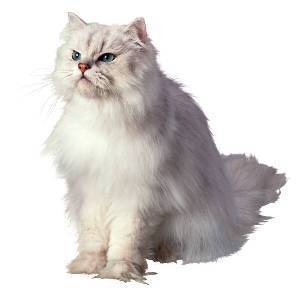 So you see, I'm all for someone who takes the mickey out of James Bond. It's like old-fashioned Doctor Who - you just have to accept that it can be a bit silly at times, and go along for the ride. So, even though I said very positive things about Andy Griffiths' books, I lied a bit. To be honest, I'm not sure they're helping us that much. Anyway, we had both been speaking at a lovely conference in Launcestion, where I apparently disgraced myself on a panel about … oh, who remembers? Except James Moloney told me I was crap, but in a nice way, for he's a nice man.I was driven to Launceston airport, which is really more like a bus shelter, to catch my plane back to Melbourne. I should point out that Launceston airport has just two departure gates,so if you're actually in the departure terminal in plenty of time, you'd have to be pretty stupid to miss your flight, especially if you have no luggage loaded. Reader, I missed my flight. And it happened because Andy started talking to me and saying nice things.He'd actually read my books, which puts him up there with about sixteen other Australians.And then he told me what he liked about them! Praise, praise, praise. It seemed I had made a new and unlikely friend.So, we talked about music and agreed that the best Bowie album is Hunky Dory and that Alice Cooper Goes to Hell is definitely underrated. So the conversation continued, with compliments spewing forth from Andy.And not a single bum amongst them. God, I loved this guy. So articulate. So misjudged. So observant.Sadly, I wasn't observant enough to realise that my plane home was being boarded and indeed taxiing to the runway.By the time I realised I had missed my flight, I was awash with Andy Griffiths' compliments,like Mr Bigglesworth's stray white fur. Then of course I had to stump up for a second air ticket.It really wasn't that much - probably the amount I was paid for speaking at the conference - but it was worth it.Because I got praise praise praise, as I’m sure that Dorothy Parker once said, so I apologiseto all those guys that post on Facebook and that I have been lambasting because they're so self-involved. (Come on, Michael, you did post a photo of yourself standing in a multi-mirrored lift, so what we saw was you from every possible angle. Okay, so the lift was in Dubai, and you were being paid squllions to teach your books there, but that didn't stop it from being a crap picture of you in a lift with a camera, and enough reflections of you to last a lifetime. But guess what? I forgive you all. I am you. Writers are horrendously self-involved.I swear, a writer could actually be on fire but if you asked them how their latest bookwas going they'd probably stand still for about ten minutes to tell you. And that's why I'm going back to Facebook. I won't link to Goodreads reviews (or any reviews), but I'll probably post the occasional picture of me (probably not in an infinitely reflective lift) and have the odd gripe about things like missing the ELR/PLR deadline for The Life of a Teenage Body-snatcher (my only reasonable seller) because I was in sodding stroke rehab. (Apparently this argument is not a valid one,not just because of the inappropriate language. They've already done the survey, because of course Penguin submitted the correct publisher form, so they know how much moneyI should have been paid, but I'm not going to get that money because I was selfish enoughto be swanning around a hospital with an impaired brain.)
So you see, I'm all for someone who takes the mickey out of James Bond. It's like old-fashioned Doctor Who - you just have to accept that it can be a bit silly at times, and go along for the ride. So, even though I said very positive things about Andy Griffiths' books, I lied a bit. To be honest, I'm not sure they're helping us that much. Anyway, we had both been speaking at a lovely conference in Launcestion, where I apparently disgraced myself on a panel about … oh, who remembers? Except James Moloney told me I was crap, but in a nice way, for he's a nice man.I was driven to Launceston airport, which is really more like a bus shelter, to catch my plane back to Melbourne. I should point out that Launceston airport has just two departure gates,so if you're actually in the departure terminal in plenty of time, you'd have to be pretty stupid to miss your flight, especially if you have no luggage loaded. Reader, I missed my flight. And it happened because Andy started talking to me and saying nice things.He'd actually read my books, which puts him up there with about sixteen other Australians.And then he told me what he liked about them! Praise, praise, praise. It seemed I had made a new and unlikely friend.So, we talked about music and agreed that the best Bowie album is Hunky Dory and that Alice Cooper Goes to Hell is definitely underrated. So the conversation continued, with compliments spewing forth from Andy.And not a single bum amongst them. God, I loved this guy. So articulate. So misjudged. So observant.Sadly, I wasn't observant enough to realise that my plane home was being boarded and indeed taxiing to the runway.By the time I realised I had missed my flight, I was awash with Andy Griffiths' compliments,like Mr Bigglesworth's stray white fur. Then of course I had to stump up for a second air ticket.It really wasn't that much - probably the amount I was paid for speaking at the conference - but it was worth it.Because I got praise praise praise, as I’m sure that Dorothy Parker once said, so I apologiseto all those guys that post on Facebook and that I have been lambasting because they're so self-involved. (Come on, Michael, you did post a photo of yourself standing in a multi-mirrored lift, so what we saw was you from every possible angle. Okay, so the lift was in Dubai, and you were being paid squllions to teach your books there, but that didn't stop it from being a crap picture of you in a lift with a camera, and enough reflections of you to last a lifetime. But guess what? I forgive you all. I am you. Writers are horrendously self-involved.I swear, a writer could actually be on fire but if you asked them how their latest bookwas going they'd probably stand still for about ten minutes to tell you. And that's why I'm going back to Facebook. I won't link to Goodreads reviews (or any reviews), but I'll probably post the occasional picture of me (probably not in an infinitely reflective lift) and have the odd gripe about things like missing the ELR/PLR deadline for The Life of a Teenage Body-snatcher (my only reasonable seller) because I was in sodding stroke rehab. (Apparently this argument is not a valid one,not just because of the inappropriate language. They've already done the survey, because of course Penguin submitted the correct publisher form, so they know how much moneyI should have been paid, but I'm not going to get that money because I was selfish enoughto be swanning around a hospital with an impaired brain.)
Published on June 20, 2012 17:04
June 15, 2012
Tara Moss did NOT fart at me in the shuttle bus

(Sorry about the italics and the enormous point. It's Blogger's wonderful new interface at work.)
I feel it necessary to clear the air in regard to a certain incident that occurred at the Somerset Celebration of Literature on the Gold Coast back in 2007. This particular festival of literature is one of the most prestigious on the literary calendar. Some writers (Hi, Sofie Laguna!) have even suggested that they would do this festival for free, and one can certainly see why. At the first one I attended, the writers were accommodated at a seafront hotel, which gave me the opportunity to have long romantic walks along the beach with my fellow authors. One of these involved a wonderful walk and talk with Erica Wagner, everyone's favourite publisher. She had just read I'm Being Stalked by a Moonshadow and told me how much she enjoyed it. (She was the first person to tell me that, possibly the last.) It was a truly beautiful moment until Erica got tangled up in some sort of drift-net that had found its way onto the beach. Erica's dextrous partner, Craig Smith, managed to untangle her. This is my lasting memory of the first Somerset Celebration I attended. I got invited back the following year, which is unusual because it really is the Rolls Royce of festivals, but I think I got the callback because they wanted a celebrity guest to deliver a speech on the night of the official launch dinner. I suggested Wendy Harmer, then begged her to do the gig, and Wendy accepted happily. The organisers felt they owed me for my effort (which was minimal, given that Wendy is not shy about public speaking, or indeed being accommodated in five star hotels on the Gold Coast). And this is the festival where that Tara Moss thing happened and I really feel I must apologise to Tara if I offended her.
This is how it happened. There was a shuttle bus that carried authors from their luxury accommodation to Somerset College, where the actual celebration took place. On my first ride on the bus I was accompanied by about twelve other writers, all being rowdy and excited and silly. I sat next to Phil Kettle, the writer who to me sounds like a recipe. It was a jolly ride, and we all arrived in tip-top shape ready to speak to the kids about our work. Tara Moss was on this trip. It's kind of hard not to notice someone as tall and attractive as Tara Moss, especially when you're sitting next to Phil Kettle. I wanted to introduce myself to her, but I never got a chance to, because she was on her phone most of the time and Jack Heath kept fainting all over her (I think this was probably by mutual arrangement). Still determined to say hello to Tara, I stalked her round the Celebration, where she was either on the phone, being orbited by Jack, or sipping from a bucket of coffee, which was her constant companion. I don't know where she got it from, but she was never without it. Now, when I caught the shuttle bus back to the hotel, the only other passenger was Tara! We'd both done our sessions and were keen to get back to the lap of luxury in which we were cocooned. (Sorry about the mixed metaphor, this is just too embarrassing to worry about such things). Tara continued to talk on that scallop phone (she was meeting friends at The Gaultier Hotel - naturally) and to slurp from that enormous bucket of coffee. The bus crossed a bridge over what looked like an estuary. Tara finished her call. And I was just about to introduce myself when something extraordinary happened. The air in the shuttle bus was redolent with a potent fart smell. Since I wasn't responsible, and the driver was separated from us by a Perspex wall, I figured it had to be Tara. And I became so obsessed with the fact that Tara Moss had farted at me (this is an exaggeration, I have no reason to believe she actually aimed) that it became very difficult for me to engage her in conversation. My adult self kept reminding me that farting was a perfectly normal human function, epecially if you're going to guzzle buckets of coffee all day, and just because Tara was overwhelmingly beautiful it didn't make her immune to the rigours of flatulence. But my schoolboy self just wanted to giggle and crack open a window. (Although my window was already open - a clue, readers.) Now, of course, a story like this only becomes funny when you tell it to someone else. And I just had to. I forget who I told, but never take an author into your confidence because they just can't help themselves. They're as discreet as The News of the World. By the end of the day, quite a few people had sympathised with me about my experience of having Austrtalia's most attractive crime writer fart at me. (The story wouldn't have spread if the farting writer had been Phil Kettle, I'm sure.) And I kept seeing Tara giving me dark looks. There was no way I could talk to her now. Someone had told her my tale. The next day on the shuttle bus I was with Dave Hackett and Jack Heath. We crossed that same bridge over the estuary and - I shudder to write this - the bus filled with fart smell again. Jack, Dave and I are smutty boys who would happily own up to being the perpetrator, but I think it was Dave who pointed out the piles of seaweed rotting under the bridge. I live in St Kilda. Every summer, sea kelp washes up on the beach and cooks in the sun. The whole town ends up smelling like a fart, becase the smell of the rotting seaweed really is that sulphurous and awful. But did I recognise it when first smelled it on that bus? No. Did I think the fart smell might in the bus might possibly have come from those piles of rotting seaeweed under the bridge? No. Instead I decided to blame the most glamorous writer in Australia. Tara, I'm really sorry, because I know someone told you that I had accused you of farting at me, when you were totally innocent of said crime. If I have another stroke I'll probably die, so it really is time for me to right some past wrongs. I would like to state, categorically, that Tara Moss did not fart at me in the shuttle bus at Somerset.

Published on June 15, 2012 19:00
Doug MacLeod's Blog
- Doug MacLeod's profile
- 22 followers
Doug MacLeod isn't a Goodreads Author
(yet),
but they
do have a blog,
so here are some recent posts imported from
their feed.



